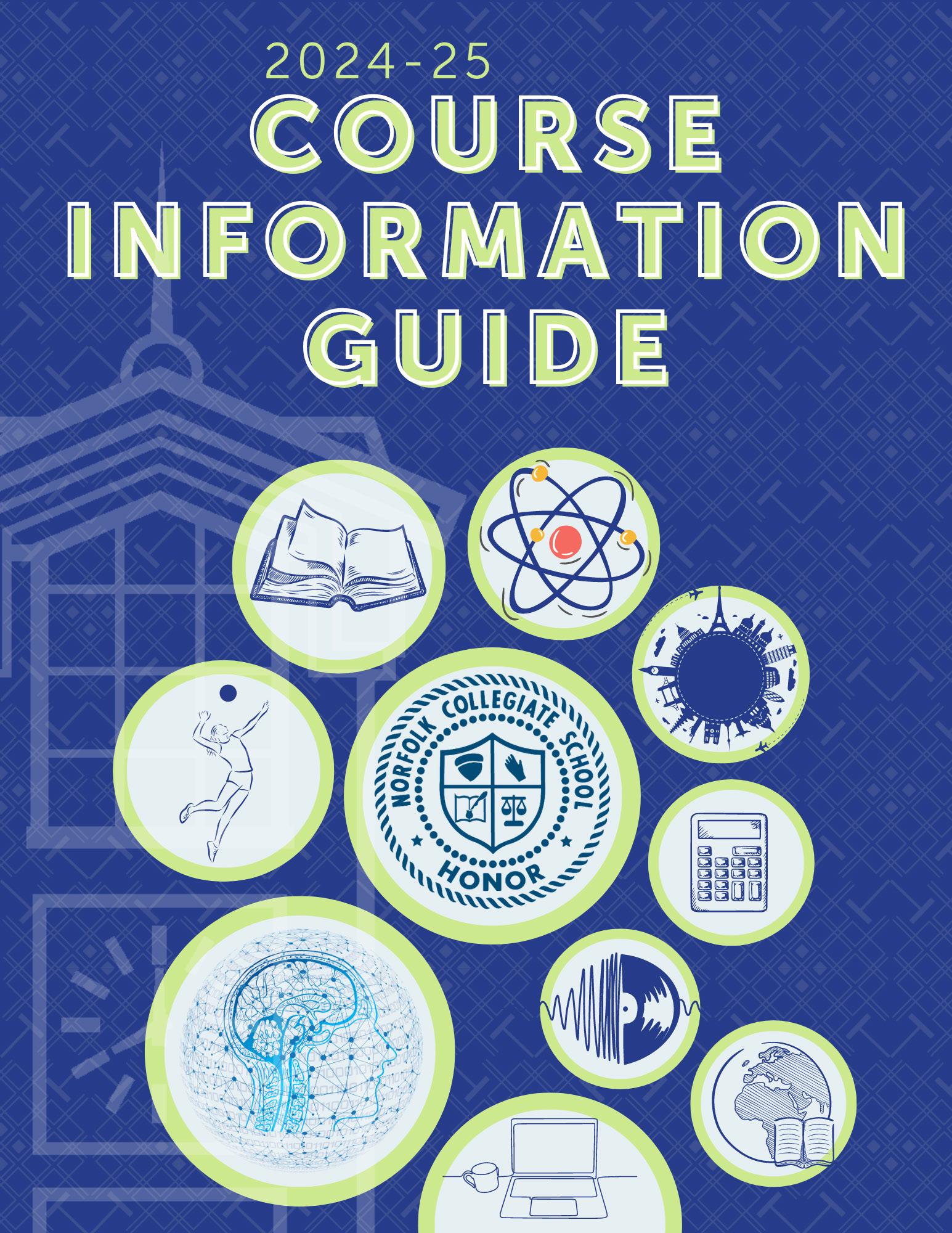
TABLE OF CONTENTS
FIND WHAT YOU NEED IN A BREEZE
PG. 3 | UPPER SCHOOL CURRICULUM
PG. 4 | NORFOLK COLLEGIATE MISSION & PROGRAM
UPPER SCHOOL COURSES
PG. 5 | UPPER SCHOOL COURSE REQUESTS & PLACEMENTS
PG. 6 | GRADUATION REQUIREMENTS
PGS. 7-9 | DESIGN THINKING & COMPUTING
PGS. 10-14 | ENGLISH
PGS. 15-17 | HEALTH & PHYSICAL EDUCATION
PGS. 18-25 | FINE & PERFORMING ARTS
PGS. 26-29 | MATHEMATICS
PGS. 30-34 | MODERN & CLASSICAL LANGUAGES
PGS. 35-39 | SCIENCES
PGS. 40-44 | SOCIAL STUDIES
PGS. 45-47 | LEARNING RESOURCE SERVICES
PGS. 48-50 | INDEPENDENT STUDY
MIDDLE SCHOOL COURSES
PGS. 51-52 | MIDDLE SCHOOL CURRICULUM
PGS. 53-54 | DESIGN THINKING & COMPUTING
PGS. 55-57 | ENGLISH
PGS. 58-59 | HEALTH & PHYSICAL EDUCATION
PGS. 60-62 | FINE & PERFORMING ARTS
PGS. 63-65 | MATHEMATICS
PGS. 66-68 | MODERN & CLASSICAL LANGUAGES
PGS. 69-71 | SCIENCES
PGS. 72-74 | SOCIAL STUDIES
PGS. 75-77 | LEARNING RESOURCE SERVICES

OUR MISSION & PROGRAM
ABOUT NORFOLK COLLEGIATE
Norfolk Collegiate’s mission is to develop critical thinkers, doers and explorers through innovative, engaging instruction in an inclusive and supportive learning community. Our program fosters a commitment to responsible and informed citizenship, connecting students to the surrounding community through our Learning to Elevate Action Program (LEAP) and robust experiential learning offerings across all disciplines. Within our rigorous college preparatory program, we empower learners to create the pathway that best suits their needs, interests and abilities. Our Oaks pursue both collaborative and independent learning opportunities inside and outside the classroom, and they welcome challenges in varied and demanding learning environments. We offer a great education and an even better experience!
ABOUT THE COURSES OFFERED
Please note the class descriptions contained in this document are designed to give students an overview of the available options in the middle and upper school curriculum. The courses offered in this guide are subject to change.
4
COURSE REQUESTS & PLACEMENTS
1 | COURSE INFORMATION NIGHT
The course request process begins at course information night as students and families explore their course options with members of the academic departments.
2 | STUDENTS WORK WITH THEIR ADVISORS
Students work with their advisors to request courses that will appeal to students’ individual interests, ensure rigorous yet balanced schedules and fulfill graduation requirements. Advisors consult with each student to check prerequisites for advanced level courses and inform students about the waiver process.
3 | COURSE REQUESTS ARE SUBMITTED ONLINE
Course requests are submitted via MyCollegiate for scheduling, once parent/guardian approval is obtained.
QUESTIONS?
Questions about waivers should be directed to the relevant department chairs. The associate director of college counseling & academic advisor is available for questions related to schedule balance and students’ four-year plans. Rising seniors may also consult the director of college counseling.

5
GRADUATION REQUIREMENTS
Students have the option of receiving a 23-credit Norfolk Collegiate Diploma or a 25-credit Norfolk Collegiate Advanced Studies Diploma. Credits earned in middle school courses equivalent to those for which Upper School credit is granted can be applied. To earn a Norfolk Collegiate Diploma, a student must take the following courses below. Please review the prerequisites in the upcoming pages to ensure the requirements are being met for the diploma of the student’s choice.
NORFOLK COLLEGIATE DIPLOMA
SUBJECT YEARS REQUIRED COURSES
English
Mathematics
Modern & Classical Languages
Social Studies
Sciences
Fine & Performing Arts
Health & Physical Education
LEAP
4 years English 9; English 10; a full year of English during the junior year chosen from AP Sem/Lang or Literary Colloquium 11 & 12; and a full year of English during the senior year chosen from among AP Sem/Lang, AP Research, AP Lit or Literary Colloquium 11 & 12
3 years Algebra I, Geometry, Algebra II
3 years of 1 language or 2 years of 2 languages
3 years Grade 9 Ancient World History, Grade 11 U.S. History or AP U.S. History, and Grade 12 U.S. Government or AP U.S. Government and Politics
3 years Biology, Chemistry and one additional full credit from the science department course offerings
1 year One full credit from approved departmental offerings
1 year Grade 9: One semester of health and one semester of PE
Full participation in and successful completion of the annual LEAP Term Project.
ADVANCED STUDIES
DIPLOMA
4 years required for Advanced Studies
Diploma
4 years required for Advanced Studies
Diploma
4 years required for Advanced Studies
Diploma
* The head of school may waive the required third year of class for students with documented language disability if request is made before beginning the third year.
AP CAPSTONETM
AP Capstone™ is a rigorous, research-based diploma program from the College Board. This program capitalizes on the strengths of Norfolk Collegiate’s current AP offerings to engage students in inquiry-based independent research, collaboration and oral and written communication as they investigate contemporary issues from multiple perspectives. Based on two foundational courses—AP Seminar and AP Research—the AP Capstone™ program offers highly qualified students the opportunity to earn either the AP Seminar and Research Certificate™ or the AP Capstone Diploma™. More information on the AP Capstone Diploma™ program is available during the course information process.
6
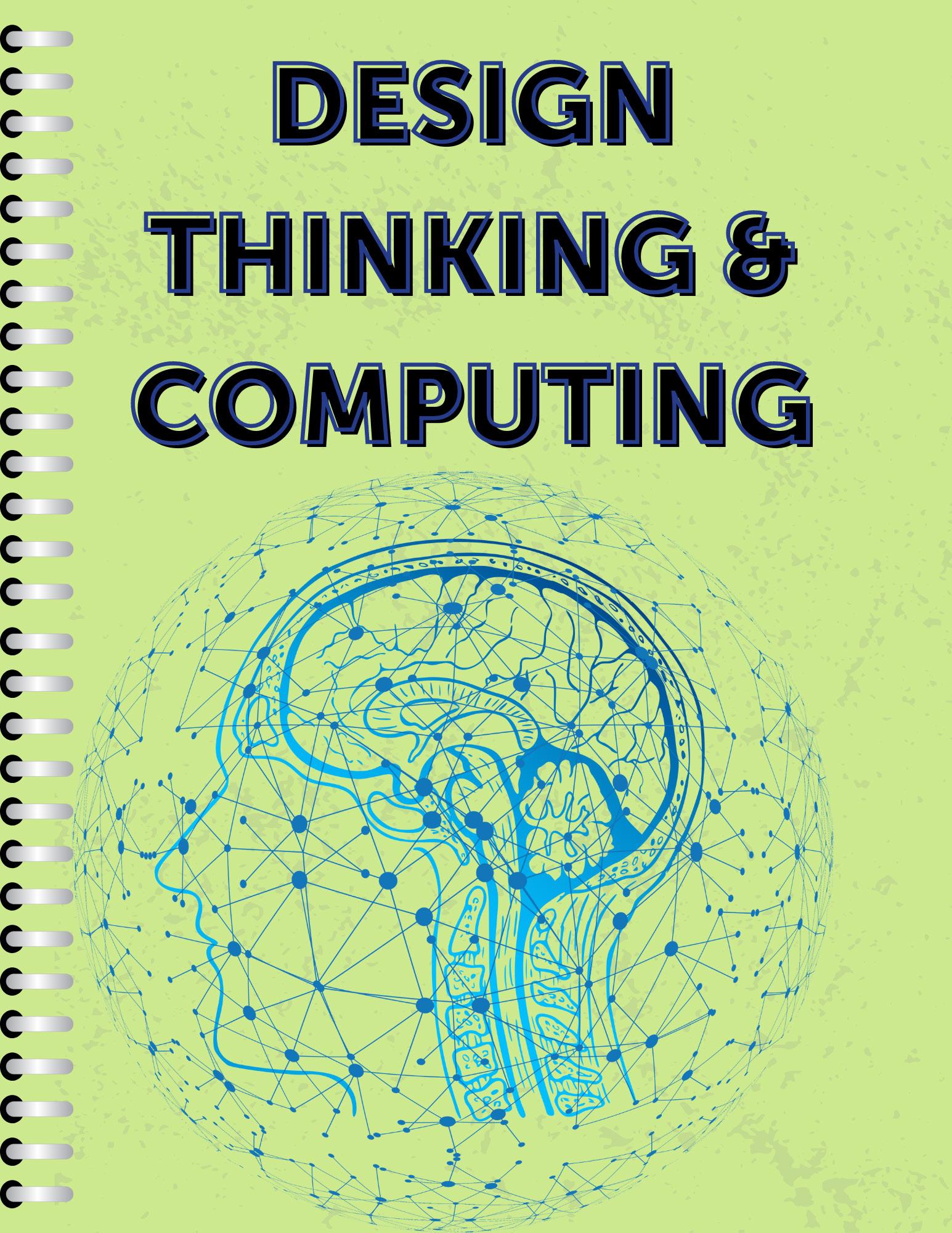
DESIGN THINKING & COMPUTING
CHAIR: BRENDAN HOYLE
The mission of the upper school design thinking and computing department is to provide students the opportunity to pursue robust coursework that develops their skills in design thinking, coding, computer science, production and communication skills. These courses take place within a collaborative, creative, interdisciplinary framework that prepares students to communicate their ideas and opinions in an increasingly complex technological society.
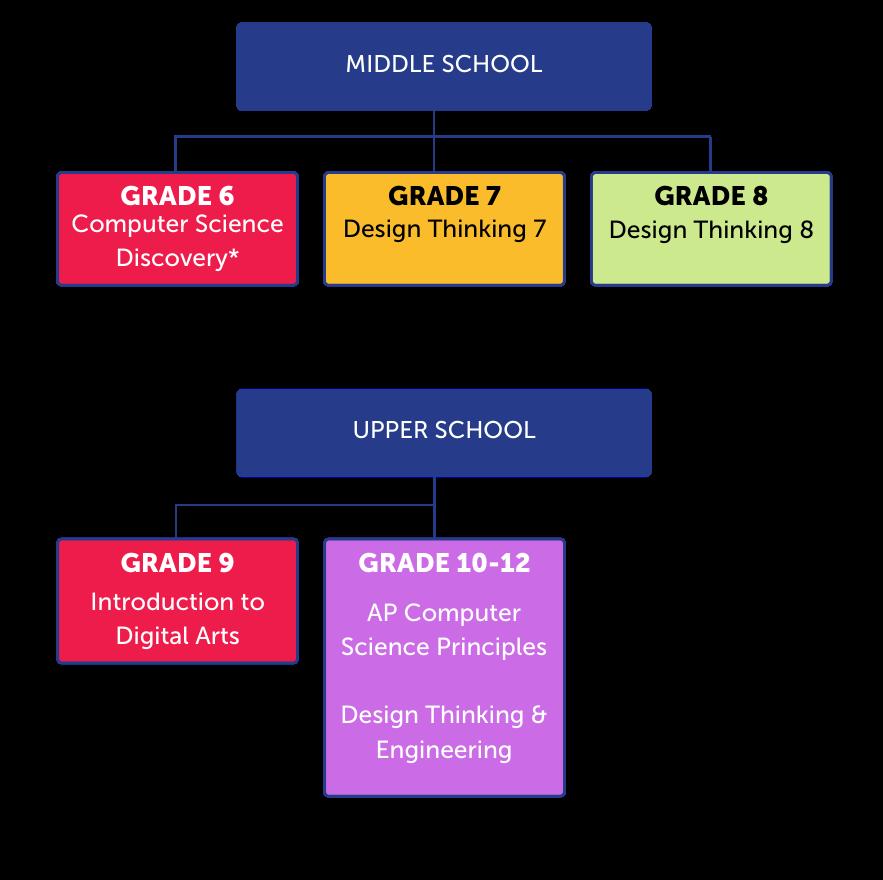
[850] INTRODUCTION TO DIGITAL ART. GRADES 9–12
This full-year course satisfies the arts requirement for graduation. In this course, students explore the use of technology to create art. The core components covered during the year include digital filmmaking, graphic arts, and computer animation. Students receive an introduction to digital video production while developing critical viewing skills and written, visual, and oral communication skills. Graphic art gives students an opportunity to practice the principles of layout, design, and the effective use of illustration and photography. The course also explores the use of animation software to produce three-dimensional computer animations. This involves the creation of 3D objects for which digital skeletons are built and movements are assigned in a sequential timeline to move objects through digital scenes. The course is project based, and the final assessment is a portfolio.
8
[862] DESIGN THINKING & ENGINEERING. GRADES 10–12
This entry-level course focuses on the principles and applications of engineering. It is an immersive handson class designed around the principles of the design thinking methodology, rapid prototyping, community engagement and creative problem solving. Through both individual and collaborative team activities, projects and problems, students apply systems thinking and consider various aspects of engineering design including material selection, human-centered design, manufacturability, assemblability and sustainability. The course focuses on, but is not limited to, computer-aided design, 3D printing, woodworking tools, molding and casting, electronics production and design, CNC milling, robotics, microcontrollers and more.
[859] ADVANCED PLACEMENT COMPUTER SCIENCE PRINCIPLES. GRADES 10–12
AP Computer Science Principles introduces students to the central ideas of computer science, instilling the ideas and practices of computational thinking and inviting students to understand how computing changes the world. The course is organized around seven “Big Ideas”: creativity, abstraction, data and information, algorithms, programming, the Internet, and global impact. Students will complete two through-course performance tasks and a timed, end-of-course exam. All AP Computer Science Principles students are required to complete all through-course performance tasks as well as the AP exam in May.
[861] ADVANCED PLACEMENT COMPUTER SCIENCE A. GRADES 11–12
AP Computer Science A is a college-level course intended for students who have already taken another computer science course or students who have some basic programming experience. AP Computer Science A has a deeper focus on coding than AP Computer Science Principles and uses the Java programming language. Students learn how to design, implement, and analyze programs to solve problems and explore foundational computer science concepts such as abstraction, programming paradigms, and data structures. Throughout the course, students work on a variety of programming projects and assignments, including hands-on coding exercises and problem-solving activities. In addition to learning the technical aspects of computer science, students also gain important skills in critical thinking, problem solving, and collaboration. All AP Computer Science A students are required to take the AP exam in May.
9

10
ENGLISH
CHAIR: AMY ROBB
The English department is dedicated to fostering an appreciation of literature while developing self-driven critical thinkers, readers, writers, and speakers through a challenging, student-centered curriculum.
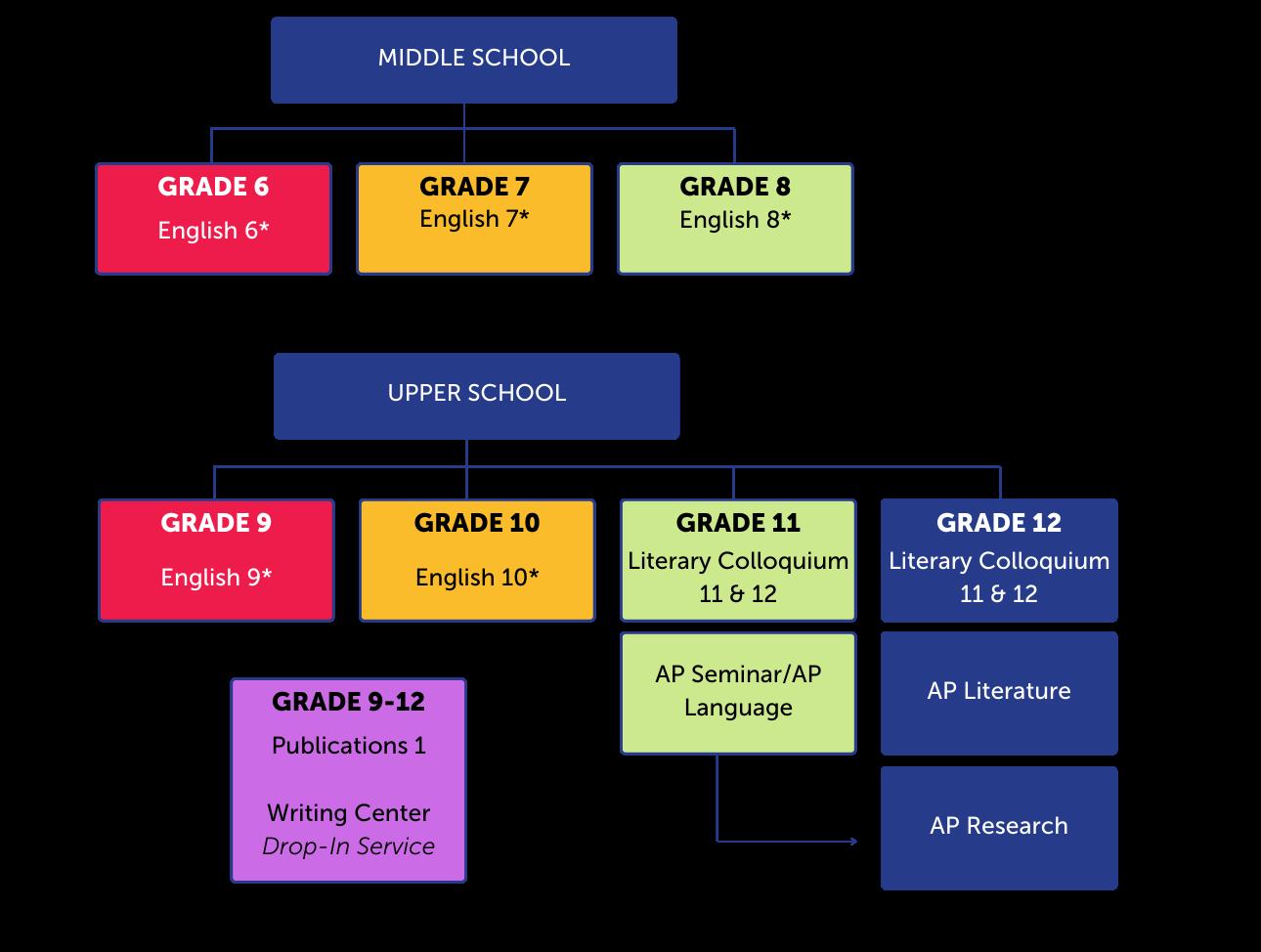
[144] ENGLISH 9.
In this course which explores the themes of power and corruption, students work to understand the intricate relationships between language, media and the persuasive techniques employed by those in positions of power. A thematic selection of texts includes Circe, Julius Caesar and Children of Blood and Bone. This course empowers students with critical skills necessary for effective communication, both in writing and orally, while fostering an understanding of the dynamics of power and corruption in various forms. By the end of this course, students emerge with a heightened awareness of the language of power, the influence of media and the tools of persuasion. They are equipped with the skills necessary to navigate and critically assess information in an increasingly complex and interconnected world.
11
ENGLISH
[165] ENGLISH 10.
PREREQUISITE—English 9
In this course which explores the themes of the individual and society, students examine language and multimedia, delving into the intersection of personal identity and the broader global context. Through a diverse range of texts and activities, students hone essential communication skills, engage in multimedia presentations and delve into professional communication, research methodologies and creative expression. Through a thematic selection of texts which include Frankenstein and Lord of the Flies, this course equips students with the necessary skills to navigate both personal and academic spheres effectively. Through a combination of multimedia projects, research endeavors and creative expression, students emerge with a heightened understanding of self, the world and the power of language to bridge the two.
ENGLISH DEPARTMENT CORE ELECTIVES
These courses fulfill the junior and senior English requirement.
[191] ADVANCED PLACEMENT SEMINAR/ADVANCED PLACEMENT ENGLISH LANGUAGE AND COMPOSITION. GRADES 11–12
PREREQUISITE—A minimum grade of 90 in English 10
Advanced Placement Seminar/Advanced Placement English Language and Composition is a fullyear course designed to replicate the typical first-year college rhetoric and composition requirement through an exploration of real-world issues. Using a student-centered, inquiry-based framework, this course focuses on analyzing and composing personal, expository, descriptive, narrative, persuasive and academic texts. Students read and analyze a wide variety of non-fiction arguments ranging from historic speeches and essays to contemporary autobiographical, narrative, political, and persuasive articles, essays, books, performances and visual compositions. The course includes focused study of research strategies, the writing process, organization and development of arguments, oral and written style and delivery and grammar and mechanics. Students in this course are expected to complete summer reading and writing assignments. All AP Seminar/AP English Language and Composition students are required to take both AP exams in May.
[189] ADVANCED PLACEMENT ENGLISH LITERATURE AND COMPOSITION. GRADE 12
PREREQUISITE—A minimum grade of 90 in junior year English course
Advanced Placement English Literature and Composition is a full-year course designed to build the advanced analytical reading and writing skills typically found in the first-year college literature and composition course. Students explore the history, genres, and literary movements associated with selected classical, world, American, and British authors through novels, short fiction, poetry, drama, and essays. Students write a variety of analytical essays from multiple critical perspectives and compose original poems and stories. Candidates for the course are expected to complete summer reading and writing assignments. All AP English Literature and Composition students are required to take the AP exam in May.
12
ENGLISH
[192] ADVANCED PLACEMENT RESEARCH. GRADE 12
PREREQUISITE—A minimum score of 3 on the AP Seminar exam AND successful completion of AP Seminar/AP English Language and Composition
Advanced Placement Research is a full-year course designed to replicate a college-level, inquirybased, student-centered undergraduate research experience. Students will choose their own topics for year-long research projects, which will culminate in formal academic essays, oral presentations, and oral thesis defenses. The course includes focused study of research strategies, the writing process, organization and development of arguments, oral and written style and delivery, and grammar and mechanics. Students in this course are expected to complete summer reading and writing assignments. All AP Research students are required to complete all through-course performance tasks, which result in the students’ AP exam scores. Students who successfully complete AP Research will be candidates for the AP Capstone Diploma or the AP Seminar and Research Certificate.
[195] LITERARY COLLOQUIUM 11 & 12: LOVE, CARE AND OBSESSION. GRADES 11–12
In this course which explores the dynamics of love, care and obsession, students explore human emotions, relationships and the complexities of love and obsession in fiction, film, poetry and other genres. Through critical analysis, literary theory and research methodologies, students unravel the intricacies of these themes and their cultural significance. Using texts which include the works of F. Scott Fitzgerald and Virginia Woolf as thematic touchstones, students refine their analytical and research skills and engage various critical lenses. This course prepares students to think reflexively about how they navigate personal connections, interests and commitments.
[196] LITERARY COLLOQUIUM 11 & 12: TRANSFORMATION AND MUTATION. GRADES 11–12
In this course, students embark on an immersive exploration of change, growth and the dynamics of transformation as portrayed in fiction, film, poetry and other genres. Through critical analysis, literary theory and research methodologies, students unravel the complexities of these themes and their cultural significance. Cornerstone authors include H. G. Wells and Neil Gaiman. Students refine their analytical and research skills and engage various critical lenses. This course empowers students to think reflexively as they navigate their own transformations from childhood to adulthood.
13
ENGLISH
ENGLISH DEPARTMENT ELECTIVES
These courses do not fulfill the English requirement.
[145] PUBLICATIONS I. GRADES 9–12
This course combines an exploration of yearbook production and the fundamentals of journalism. Students will learn to create both the school yearbook, The Acorn, and the school newspaper, The Oak Leaf. The focus of this course will include basic journalism principles, including writing and editing various story types, crafting headlines and photo captions, interviewing and reporting; design principles, including print page layout and website design; and photography principles, including digital photography basics, photo composition, balance and visual storytelling. Emphasis will be placed on theme development, writing, design creation, executing photo assignments and gaining practical experience in journalistic practices.
[143] WRITING CENTER. GRADES 9–12
This additional service is not offered for credit but is a drop-in service available to students in grades 9-12 by appointment with a writing center staff member. At the writing center, students receive individualized feedback on writing assignments of all types, in any subject area, and at any stage in the writing process, from brainstorming to final revision and proofreading. Writing center instructors engage with students by asking clarifying questions, suggesting strategies and helping young writers develop their own ideas and insights. This one-on-one approach encourages students to be selfmotivated, inquisitive, independent thinkers and writers, and teaches them to develop the self-editing skills crucial for success in college and beyond.
14
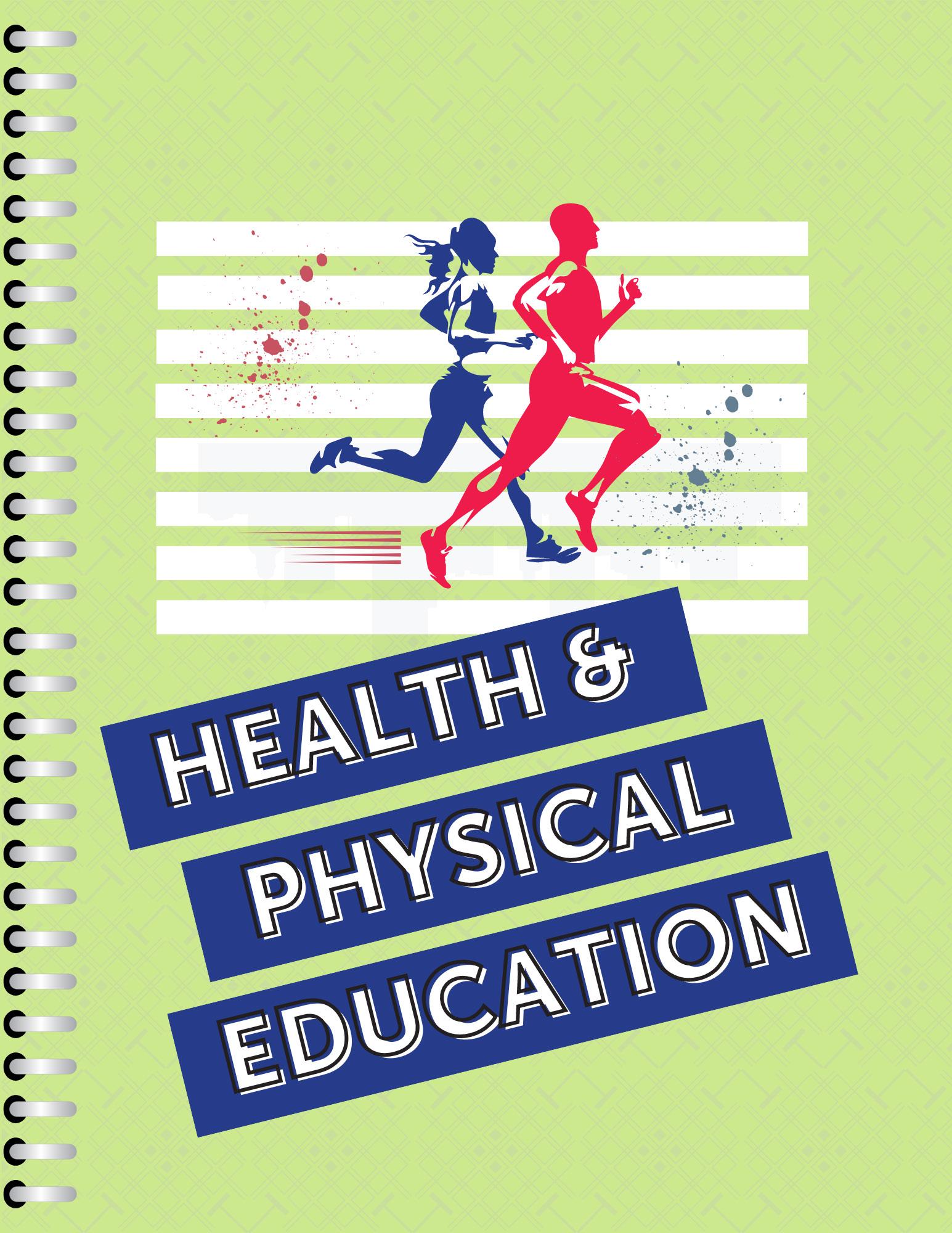
HEALTH & PHYSICAL EDUCATION
CHAIR: JON HALL & SUSIE POTTER
The health and physical education program supports students in reaching their highest potential for health, vitality, and wellness and empowers them to sustain regular, lifelong physical activity as a foundation for a healthy, productive, and fulfilling life.
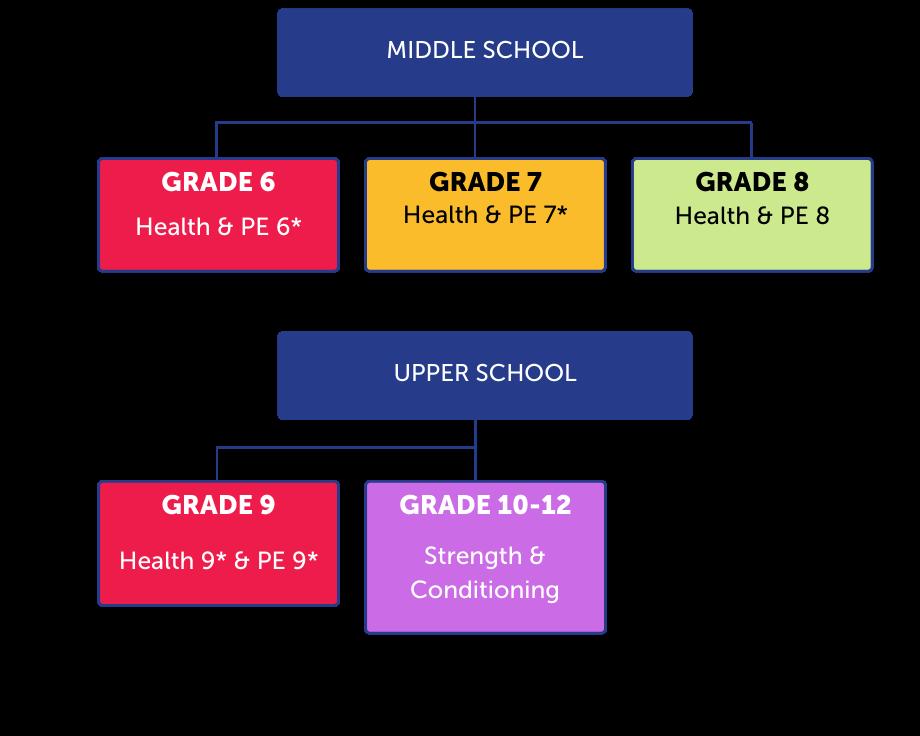
[655] PHYSICAL EDUCATION 9. [½ CREDIT] GRADE 9
Physical education 9 provides a hands-on approach to personal fitness, exercise, and body image. Students assess their individual needs, understand how the body uses food for nutrition, and develop a complete, individualized wellness plan for a healthier lifestyle. A variety of units are covered to encompass the total wellbeing of each student, including personal assessment and goal setting, cardiovascular fitness, muscular strength and endurance, flexibility exercises and a culminating personal plan project.
16
HEALTH & PHYSICAL EDUCATION
[656] HEALTH EDUCATION 9. [½ CREDIT] GRADE 9
Health education 9 is a one-semester course designed to provide basic life skills for the adolescent years and beyond. Students work on multiple aspects of healthy living and decision-making skills that address their self-esteem, values and morals. Throughout the course, students engage in individual and project-based assignments that employ group discussions on mental disorders, substance abuse and eating disorders. The course covers a basic introduction to human reproductive anatomy, sexually transmitted infections, and unplanned pregnancy, a unit that includes both independent and projectbased assignments and maintains an emphasis on abstinence. This course introduces students to basic CPR and emergency first aid strategies. It also covers strategies for mental wellbeing, including mindfulness and meditation.
[660] STRENGTH & CONDITIONING. GRADES 10–12
In this course, students learn a wide range of exercises combining agility, flexibility, strength, aerobic conditioning and speed as well as sport-specific training. The objective is to improve each student’s mental and physical wellness with a personalized program to support their individual goals. Strength and conditioning aims to equip students to prevent athletic injuries, support proper long-term athletic development, improve athletic performance and long-term health and increase safety in the gym and on the field.
17

FINE & PERFORMING ARTS
CHAIR: BRENDAN HOYLE
The mission of the fine and performing arts department is to discover, encourage, inspire and showcase each student’s unique talents. The program seeks to nurture and celebrate each student’s diverse gifts through engaging, innovative instruction that enhances the understanding and appreciation of art, music and theater as they relate to the student, the school and the world at large.
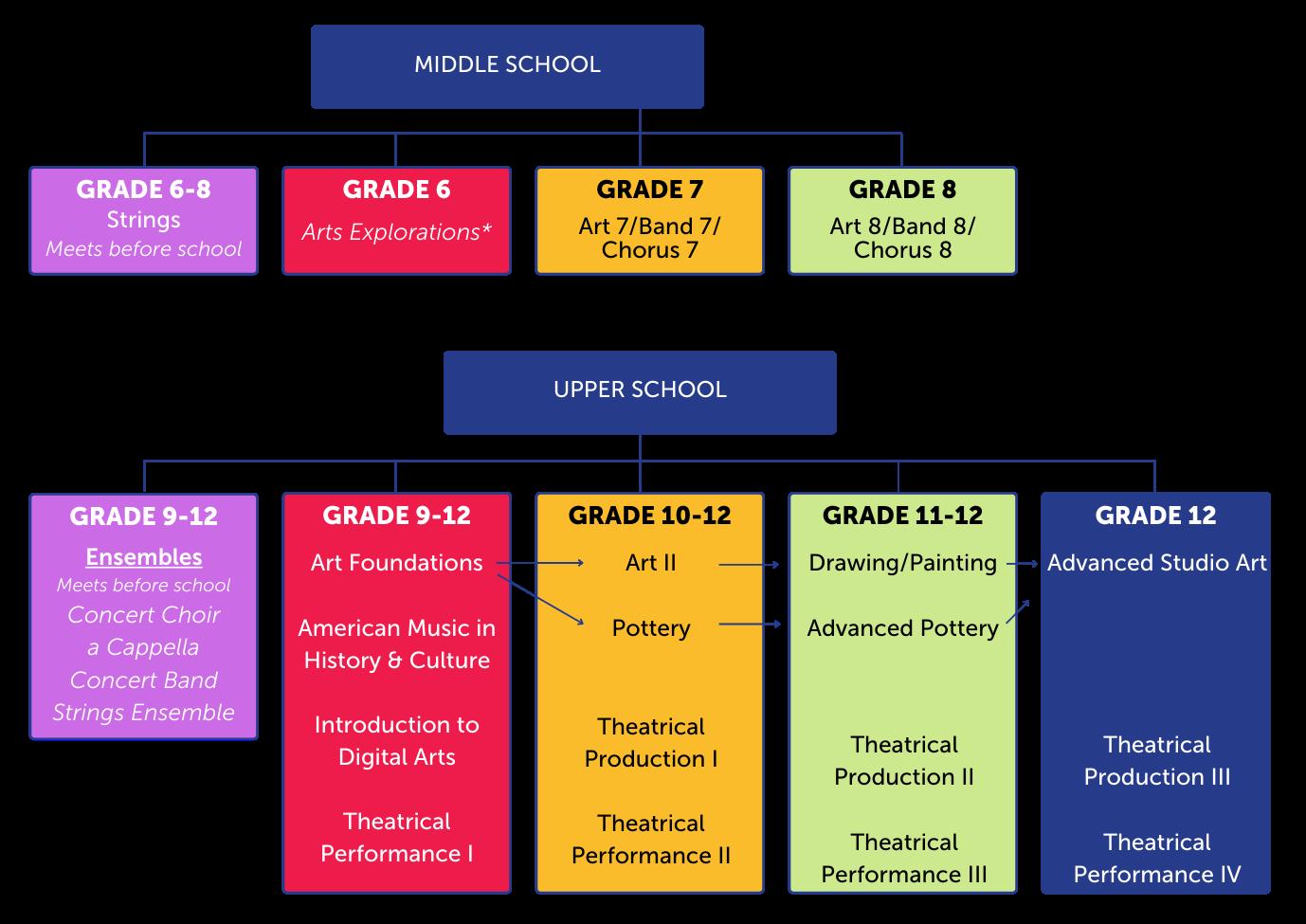
19
ARTS
FINE & PERFORMING ARTS DEPARTMENT CORE ELECTIVES
These courses fulfill the arts requirement for graduation. All students are required to complete one full credit of fine or performing arts to graduate.
[751] ART FOUNDATIONS. GRADES 9–12
In this full-year, introductory art class students explore the fundamental concepts of art. Students use a wide range of media and techniques to transform how they see and think. This course begins students on their path to understand the language used by artists and designers as they develop new abilities using a broad range of media. This course satisfies the arts requirement for graduation.
[850] INTRODUCTION TO DIGITAL ARTS. GRADES 9–12
In this full-year course, students explore the use of technology to create art, including digital filmmaking, graphic arts, and computer animation. Students receive an introduction to digital video production while developing critical viewing skills and written, visual, and oral communication skills. Graphic art gives students an opportunity to practice the principles of layout and design and the effective use of illustration and photography. The course also explores the use of animation software to produce three-dimensional computer animations. This involves the creation of 3-D objects for which digital skeletons are built and movements are assigned in a sequential timeline to move objects through digital scenes. The course is project based, and the final assessment is a portfolio. This course satisfies the arts requirement for graduation.
[797] AMERICAN MUSIC IN HISTORY & CULTURE. GRADES 9–12
This is a non-performance course that explores America’s contributions to music through listening experiences and comparing music to historical and current events. Genres of music to be covered will range from classical and jazz music to rock, country, musical theater, hip-hop and current popular music, in addition to their respective composers and performers. Students will investigate the lineage of the various styles, their cultural relevance and their timelines. Learning activities in this course will include, but are not limited to, listening, discussions, projects and presentations.
[775] INTRODUCTION TO GUITAR. GRADES 9–12
This is a class for beginning level and intermediate guitar students. Beginning notation, theory, chords, and performance skills are studied. This is a full-year course taught during the academic day.
FINE
PERFORMING
20
&
FINE & PERFORMING ARTS
[779] THEATRICAL PERFORMANCE I. GRADES 9–12
This full-year course familiarizes students with basic acting fundamentals, history, improvisation, blocking, stage movement, and selective play readings. Grading is participation-based. This class supports the entire drama program and assists in preparation for all theater productions.
[787] UPPER SCHOOL CONCERT CHOIR. GRADES 9–12 [½ CREDIT]
This is a year-long upper level course offered before school to experienced music students who are accomplished in vocal performance. Students continue to develop vocal technique and musicianship, as well as critical thinking skills, through analysis of music and its elements including form and text. This course explores many genres and styles of music and its evolution into the vocal setting with experiences in ensemble and solo singing. Students are expected to perform in evening concerts during the year, as well as daytime concerts in the school and local community. This ½ credit course meets before the academic day.
[773] UPPER SCHOOL A CAPPELLA CHORUS. GRADES 9–12 [½ CREDIT]
Prerequisite—Enrollment in Upper School Concert Choir or departmental approval
Students learn the basics of a cappella singing (singing without instrumental accompaniment) in a comfortable group setting. Not only will students see an increase in performance skills and musicality but also in self-confidence, ear training, blending of voices, and the ability to work as part of a team. The class culminates with a performance at each choral concert. This ½ credit course meets before the academic day.
[760] UPPER SCHOOL CONCERT BAND. GRADES 9–12 [½ CREDIT]
PREREQUISITE—Middle School Band or departmental approval
Upper School Concert Band is an advanced level course for students with previous band experience. Emphasis is on the advancement of instrument technique, the further development of ensemble performance skills and rehearsal, and performance of intermediate to advanced level band music. Concert band students also will be expected to be committed to excellence and to participate in community and school concerts, social performances, field trips, graduation, and Pep Band. This ½ credit course meets before the academic day.
[786] UPPER SCHOOL JAZZ BAND. GRADES 9–12 [½ CREDIT]
PREREQUISITE—Enrollment in Upper School Concert Band or departmental approval
The class is offered to experienced musicians and includes guitar, keyboard, bass, and drum kit. This ensemble focuses on big band instrumentation studies and performs the music of the foremost big band composers, past and present. Students will develop as creative improvisers and soloists throughout the course. The jazz students will also be expected to be committed to excellence and to participate in festivals, field trips, community and school concerts, social performances, and Pep Band. This ½ credit course meets before the academic day.
21
FINE & PERFORMING ARTS
[769] UPPER SCHOOL STRINGS ENSEMBLE. GRADES 9–12 [½ CREDIT]
PREREQUISITE—Middle School Strings Ensemble or departmental approval
Upper School Strings meets before school and is a full-year course open to all upper school students. Instruments include violin, viola, cello, and bass. Students learn various styles including classical, jazz, and folk songs while polishing their ensemble skills and performance techniques. This class requires performances in school and in the community throughout the year. This ½ credit course meets before the academic day.
FINE AND PERFORMING ARTS DEPARTMENT ADVANCED ELECTIVES
[778] THEATRICAL PRODUCTION I. GRADES 10–12
In this full-year course, students are introduced to many of the concepts and techniques employed in technical theater production. Subjects include safe, proper use of power and hand tools; scenic design, construction and painting; stage lighting and sound design and implementation; stage properties fabrication; and costume design. Students are responsible for the technical aspects of all upper and middle school productions including the construction of sets, hanging and focusing of lighting instruments, procurement of all costumes, and procurement or fabrication of all stage properties. In addition, students learn how to use many of the Hackney Theater’s technologies including the counterweight rigging system and video projection system.
[752] ART II. GRADES 10–12
PREREQUISITE—Art Foundations or departmental approval
In this full-year advanced course, students expand their knowledge gained from Art Foundations to explore new and different techniques in pottery, drawing, painting, printmaking, and sculpture.
[746] POTTERY. GRADES 10–12
PREREQUISITE—Art Foundations or departmental approval
This full-year introductory course in ceramics is designed to explore a broad range of techniques and approaches to art through hand-built and wheel-thrown clay.
22
ARTS
[794] DIGITAL PHOTOGRAPHY AND PHOTO ILLUSTRATION. GRADES 10–12
PREREQUISITE—Art Foundations, Introduction to Digital Arts, or departmental approval
This full-year course introduces the fundamentals of photography and photo illustration. Students understand the basic operations/functions of a digital camera, lighting, exposure, composition, and digital manipulation. In addition, students use the elements of art and principles of design to produce quality work. Throughout this course, students explore the history of photography and view work from both traditional and contemporary photographers. Students develop design skills using Adobe Creative Suite. Self and group critiques are held throughout the course. Written assignments help develop each student’s skill in research and interpretation.
[753] DRAWING. [FIRST SEMESTER] GRADES 10-12
PREREQUISITE—Art II or departmental approval
This concentrated studio course teaches students basic skills and techniques in drawing from direct observation. Media such as graphite, charcoal, oil pastels and colored pencils will be explored in order to develop a personal style. Students also will learn how to present their work, practice critiques and enter their work in art exhibits. Significant artists throughout time will be explored. This is a onesemester course.
[757] PAINTING. [SECOND SEMESTER] GRADES 10-12
PREREQUISITE—Art II or departmental approval
This studio course provides students with a deep exploration of painting. Students will develop an understanding of formal concepts, paint manipulation, and further painting techniques. Watercolors, acrylics, oils, and mixed media will be investigated. Students will learn traditional concepts, while also having the opportunity to work in non-traditional methods. Significant painters throughout time will be explored. This is a one-semester course.
[747] ADVANCED POTTERY. GRADES 11–12
PREREQUISITE—Pottery
This full-year intensive course in ceramics is designed to focus on specific techniques and approaches in hand-built and wheel-thrown clay.
[795] ADVANCED STUDIO ART. GRADES 11–12
PREREQUISITE—Art II AND either Advanced Pottery OR Drawing/Painting OR departmental approval
In this full-year advanced course, students expand their knowledge gained from Art Foundations and other advanced art electives to explore new and different techniques in pottery, drawing, painting, printmaking and sculpture.
FINE & PERFORMING
23
FINE & PERFORMING ARTS
[783] THEATRICAL PRODUCTION II. GRADES 10–12
PREREQUISITE—Theatrical Production I
In this full-year course, students continue to implement the concepts and techniques introduced in Theatrical Production I. Theatrical Production II students concentrate on theatrical design with a focus on drafting, technical direction, and production management. Other subjects include safe, proper use of power and hand tools; scenic design, construction and painting; stage lighting and sound design and implementation; stage properties fabrication; and costume design. Students are responsible for the technical aspects of all upper and middle school productions including the construction of sets, hanging and focusing of lighting instruments, procurement of all costumes, and procurement or fabrication of all stage properties.
[789] THEATRICAL PRODUCTION III. GRADES 11–12
PREREQUISITE—Theatrical Production lI
In this full-year course, students focus on full-scale production design. Using the concepts and techniques introduced in Theatrical Production I and II, students concentrate on theatrical design with a focus on color, themes, and motifs. Students research traditional and non-traditional theater arts and how design creates the theatrical world as described by the playwright and director. Students also are responsible for creating a full production design for a traditional play and a non-traditional play. Other subjects include safe, proper use of power and hand tools; scenic design, construction and painting; stage lighting and sound design and implementation; stage properties fabrication; and costume design. Students are responsible for the technical aspects for all upper and middle school productions including the construction of sets, hanging and focusing of lighting instruments, procurement of all costumes, and procurement or fabrication of all stage properties.
[793] THEATRICAL PRODUCTION IV. GRADE 12
PREREQUISITE Theatrical Production lII
This course is centered on mastering the art of theatrical design. Students spend time working on the five most common elements of stage design: scenic, lighting, sound, props, and costumes. Each student takes on the role of a designer for one of the three yearly productions. As designers, they are responsible for creating a unified vision with the director of the production. Students carry this design process to completion, overseeing other production students and leading set builds, light hang/focus, costume builds, and more. Additionally, a component of the class focuses on design thinking and student-driven projects. Theatrical Production IV students also spend extensive time in class working on an independent project selected by the student with guidance from the teacher.
[782] THEATRICAL PERFORMANCE II. GRADES 10–12
PREREQUISITE Theatrical Performance I
This full-year, intermediate class is designed for students with a year or more of experience and promotes enjoyment and appreciation for all aspects of theater through opportunities to build significantly on existing skills. Class work focuses on characterization, playwriting, and playwrights’ contributions to theater while improvisation, creative dramatics, and scene work are used to help students challenge and strengthen their acting skills. This course provides opportunities for students to strengthen skills in critical listening and thinking, as well as stage presence, ensemble work, audition and performance technique, and aesthetic response.
24
FINE & PERFORMING ARTS
[792] THEATRICAL PERFORMANCE III. GRADES 11–12
PREREQUISITE—Theatrical Performance II
This full-year course is a performance-based class. Through a collaborative process, students learn advanced skills in acting through movement, advanced character development, and play and character analysis. Students develop audition skills and are required to assist in preparing for all theater productions.
[796] THEATRICAL PERFORMANCE IV. GRADE 12
PREREQUISITE—Theatrical
Performance
III
This course is a performance-based class. Through a collaborative process, students learn advanced skills in acting through movement, advanced character development, and play and character analysis. Students solidify their prior knowledge and practice of monologue and dialogue work. Students develop audition skills and are required to work in some capacity with one of the school productions. This course culminates in a final project of the student’s choosing, with approval from the instructor.
25
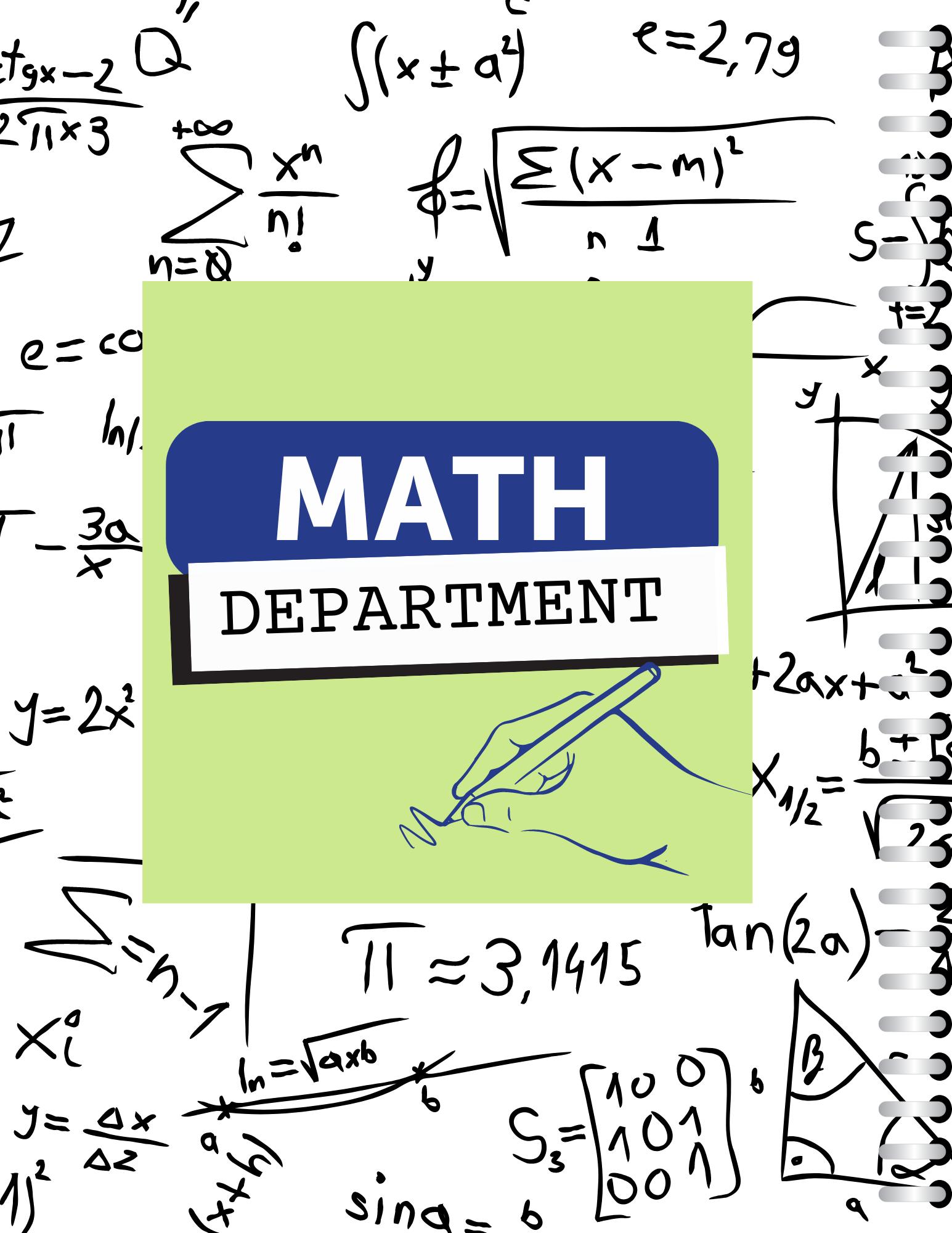
MATHEMATICS
CHAIR: REBECCA ZBOROWSKI
The mission of the math department is to educate a diverse body of students to the highest level that they can individually achieve. Challenging courses are offered at all levels of mathematics to ensure graduates will be able to seamlessly move to their studies in college. Math teachers use a variety of teaching methods in a collaborative and supportive environment.
Student placement is based on performance and experience in previous math courses at the direction of the department chair. Students will need to have a TI-83 or TI-84 graphing calculator throughout each course.
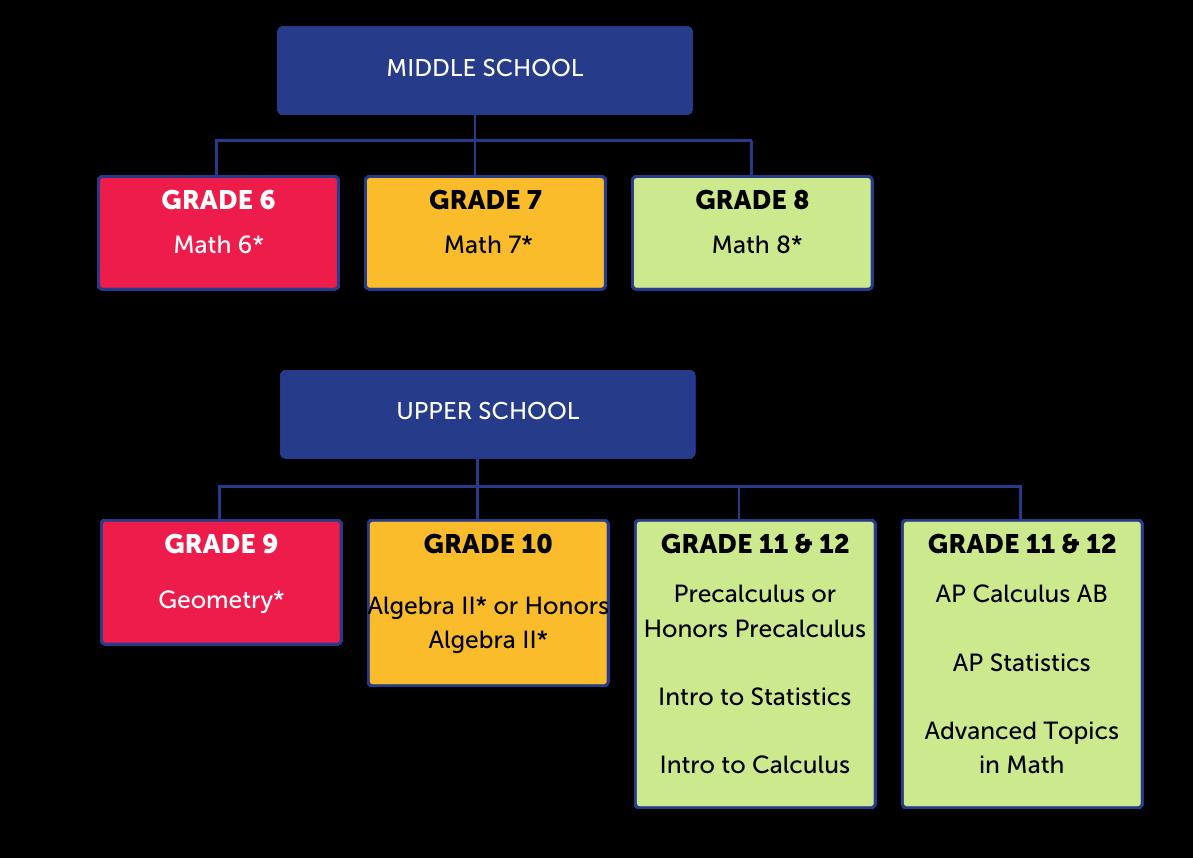
I.
PREREQUISITE—Pre-Algebra
Algebra I covers all fundamental concepts of algebra including a review of the use of variables and basic operations of addition, subtraction, multiplication and division, as well as equations and inequalities, linear equations, quadratic equations, exponential functions, and multiplying and factoring polynomial expressions. The TI-84 series graphing calculator is used in the presentation of functions, linear equations, quadratic equations and inequalities.
27
[240] ALGEBRA
MATHEMATICS
[250] GEOMETRY.
PREREQUISITE—Algebra I
Geometry builds on basic algebraic skills to further develop and examine geometric concepts through models and coordinate geometry. Hands-on activities and formal proof methods are used to enhance the understanding of two- and three-dimensional reasoning and problem-solving skills. The TI-84 series graphing calculator is used to model basic theorems involving polygons and solid figures and in the introduction and application of trigonometric functions.
[260] ALGEBRA II.
PREREQUISITE—Geometry
In Algebra II, students continue to develop an understanding of concepts related to algebra, a mathematical field that serves as an important foundation for later math study. Students cover the major function families, including polynomials, inequalities, rationals, exponentials, logarithms, and function transformations. Building on concepts introduced in Geometry, students also learn more about the basic trigonometric functions.
[263] HONORS ALGEBRA II/TRIGONOMETRY.
PREREQUISITE—Geometry and departmental approval
This course includes all topics of Algebra II but moves at a faster pace and requires students to apply the information learned in new and challenging situations. The curriculum incorporates an additional six weeks of trigonometry, covering the unit circle, identities and trig function graphs.
[274] PRE-CALCULUS.
PREREQUISITE—a minimum grade of 80 in Algebra II or completion of Honors Algebra II/Trigonometry
This course provides students with an important foundation for advanced concepts used in calculus. Students continue the study of algebraic functions begun in Algebra I and II, building mastery of modeling these functions in a variety of ways. Course content includes the graphing of functions, problem solving, probability and trigonometry. Topics in this course are applied in fields like physics, biology, chemistry, health science, social science and data science.
[275] HONORS PRE-CALCULUS.
PREREQUISITE—A minimum grade of 86 in Honors Algebra II/Trigonometry and departmental approval, or an 86 in Pre-Calculus
This course examines trigonometric concepts, analytic geometry, algebraic functions, probability and sequences and series. The course brings together all the skills necessary for the study of calculus, and the graphing calculator is used to help students develop the algebraic and graphic skills needed in AP Calculus. Students have the option of taking the AP Precalculus exam at the end of this course.
28
MATHEMATICS
[291] ADVANCED TOPICS IN MATH.
PREREQUISITE–Algebra II
This full-year course investigates real-world examples using problem- and inquiry-based mathematical practices. Students explore several new advanced topics in math while reviewing integral components of algebra and geometry. Unit topics may include math applications involving finance, interpreting data, population growth and probability. The goal of this course is to improve students’ critical thinking and quantitative literacy in preparation for college math.
[271] INTRODUCTION TO CALCULUS.
PREREQUISITE—A minimum grade of 86 in Honors Pre-Calculus or 92 in Pre-Calculus
This full-year course prepares students for a calculus course, emphasizing trigonometry, pre-calculus limits, derivatives and finite sums. Students should take this course in preparation for AP Calculus or Calculus I in college. Eligible juniors are strongly encouraged to take this course to maximize the benefit of AP Calculus in their senior year.
[269] ADVANCED PLACEMENT CALCULUS AB.
PREREQUISITE—Seniors with a minimum grade of 86 in Honors Pre-Calculus or 84 in Introduction to Calculus. All juniors considering this course must discuss their academic plan with the department chair. Juniors should take Introduction to Calculus in preparation for this course but may be considered for a waiver with a minimum grade of 92 in Honors Pre-Calculus. This full-year course explores differential and integral calculus with the use of the graphing calculator to aid in mathematical analysis. The course explores all topics found in a typical college Calculus I course, as well as covering all the topics required in the AP Calculus curriculum. All AP Calculus students are required to take the AP exam in May.
[277] INTRODUCTION TO STATISTICS. GRADES 11–12
PREREQUISITE—Algebra II or Honors Algebra II/Trigonometry
This basic statistics course is a year-long course that allows students to examine probability and statistics through hands-on application. Students use graphing calculators to explore data distributions, probability and relationships of data. This course helps prepare students for a college-level statistics course and is designed primarily for seniors.
[279] ADVANCED PLACEMENT STATISTICS. GRADES 11–12
PREREQUISITE—A minimum grade of 86 in Algebra II and Geometry
Throughout this year-long course, students use graphing calculators and computer output to explore data distributions and relationships. They design experiments that apply probability and statistical concepts. Statistical inference is stressed during the last half of the course. All AP Statistics students are required to take the AP exam in May.
29
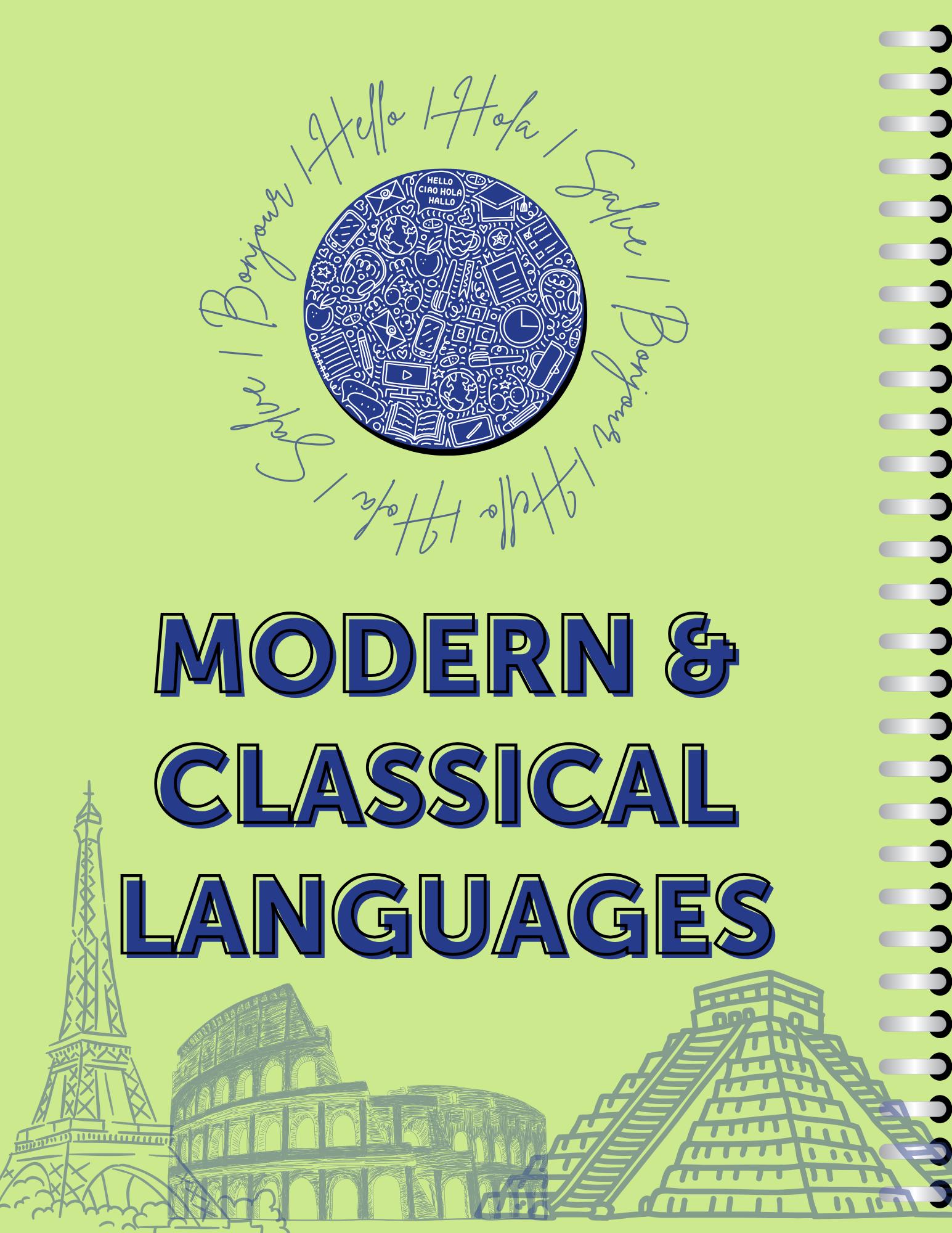
MODERN & CLASSICAL LANGUAGES
CHAIR: MEAGAN STARKS
The modern and classical languages department encourages students to explore the languages and cultures of the world as a global community. Its mission is to nurture students’ innate sense of curiosity about humankind and to enlighten students regarding the importance of communication in foreign languages. Students acquire a working knowledge of the history and foundation of these languages to better understand word origins, grammar and mechanics.
Students with a final average below 80 in any level II language are strongly encouraged to exercise the 2 + 2 graduation requirement option.
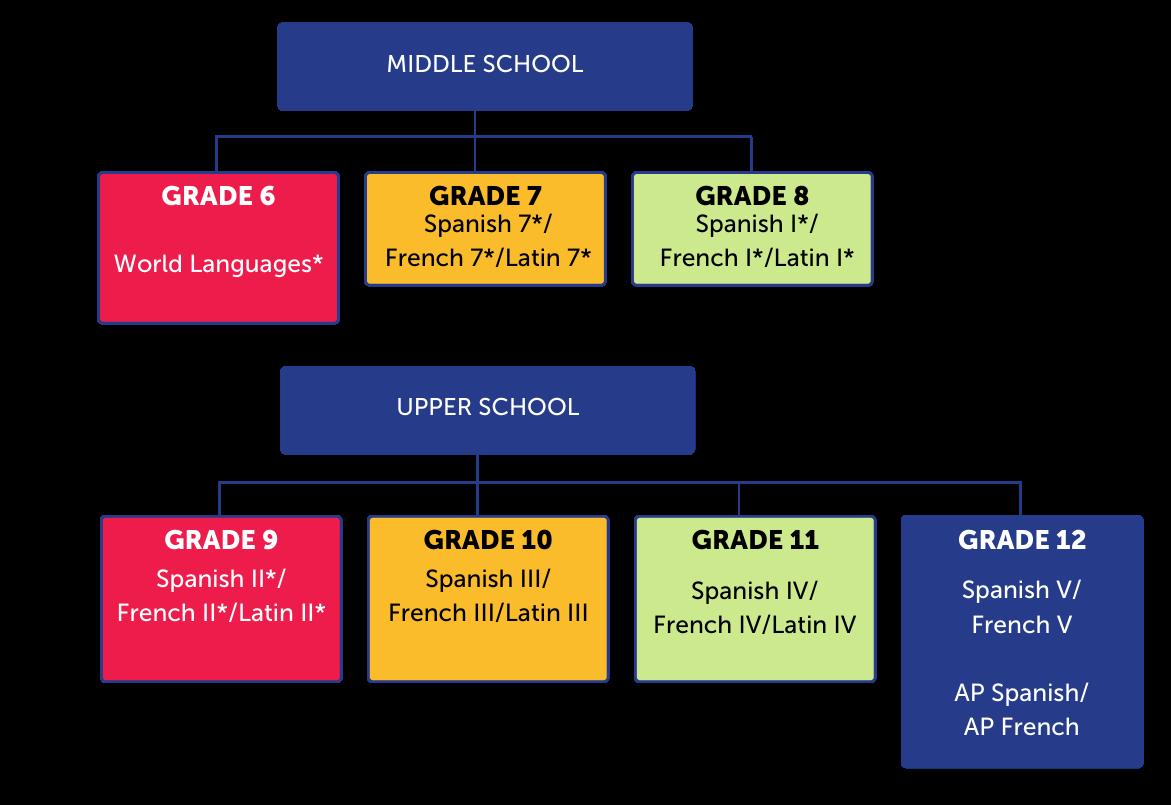
[551] FRENCH I.
French I students begin building a range of expression for both oral and written communication at the novice level. Along with emphasis on reading, listening, comprehension, writing, and speaking French, there is a beginning study of the basic grammatical structure of the language. The student’s knowledge of various French-speaking countries and their culture is expanded through class discussions and a variety of authentic materials.
31
MODERN & CLASSICAL LANGUAGES
[552] FRENCH II.
PREREQUISITE—French I
This course focuses on communicating in French through speaking, listening, reading, and writing, with increasing emphasis on the development of reading skills. A more in-depth study of the culture continues to be taught within the context of the four basic skills. Emphasis is placed on grammar, with a review of the present tense of the regular and some irregular verbs. A minimum of four tenses are studied. Using the language in daily classroom interactions is expected. The grammatical elements are taught emphasizing communication.
[553] FRENCH III.
PREREQUISITE—A minimum grade of 85 in French II
This is a rigorous academic course that requires self-discipline and commitment. In addition to speaking, listening, reading, and writing in French, students expand their knowledge of French grammar with a more in-depth study of irregular verbs. Using the language in daily classroom interactions is expected. The grammatical elements are taught with an emphasis on communication. The students’ knowledge of various French-speaking countries and their cultures is expanded through technology-based research, class discussions, and a variety of authentic materials.
[554] FRENCH IV.
PREREQUISITE—A minimum grade of 88 in French III
French IV is a challenging academic course that requires self-discipline and commitment. This course expands students’ grammar review and introduces new, more complex grammatical topics. There are ample opportunities to develop conversational and writing skills. Numerous reading selections serve as the basis for vocabulary development and class discussion. Active communication skills are reinforced to strengthen students’ linguistic base. The students’ knowledge of various French-speaking countries and their cultures is expanded through technology-based research, class discussion, and a variety of authentic materials.
[556] FRENCH V / [557] ADVANCED PLACEMENT FRENCH LANGUAGE AND CULTURE.
PREREQUISITE—A minimum grade of 88 in French IV / 90 for AP French Language and Culture
This course is a challenging, interactive course in which students continue to expand their French speaking and writing capabilities. The course develops oral comprehension and fluency, as well as written communication, through culturally relevant materials. The course is taught almost exclusively in French, and student interaction is entirely in French to provide students the opportunity to develop the three modes of communication: interpersonal, interpretive, and presentational. Students enlarge their written and spoken vocabulary, interpret and describe materials, and compare and contrast the cultures of the French-speaking world with the culture of the United States. All students who are registered for AP French Language and Culture are required to take the AP exam in May. Students who are registered for French V (non-AP) have the option of taking the AP exam. Different assessment criteria will apply for the two groups.
32
MODERN & CLASSICAL LANGUAGES
[541] LATIN I.
This course emphasizes vocabulary, word families, translation of Latin into English, comparative grammar and classical mythology. By year’s end, students are able to translate Latin texts of reasonable complexity. Some Roman legends and basic Roman history of the monarchy and the Republic are also covered. Classical mythology units cover basic myths and mythic cycles of the Greeks and Romans. Cultural data includes clothing, food, housing, transportation, games and pastimes, Roman geography, and the Western traditions passed from Rome.
[542] LATIN II.
PREREQUISITE—Latin I
Latin II emphasizes developing vocabulary growth, translation skills, and forms recognition. Grammar and syntax are emphasized as an aid to correct translation, with continued use of the comparative grammar method. Word family recognition is expanded, and literary and rhetorical devices found in Roman prose are covered. The parallels between modern American and ancient Roman societies are expanded, and Roman history from its start to the downfall of Rome is covered. Some review of Roman legend and classical mythology is included as students begin the study of authentic Latin texts.
[543] LATIN III.
PREREQUISITE—A minimum grade of 85 in Latin II
The third year of Latin is designed to increase students’ ability to translate Classical Latin into English by augmenting the vocabulary and understanding of the more complex grammatical structures. Students prepare written translations of select portions of the works read. Oral translations in class are stressed. At least one major project requires independent research and source documentation. By year’s end, students have greatly improved and enhanced their ability to translate Classical Latin, and students have gained an understanding of the contributions of Roman society to Western civilization.
[550] LATIN IV.
PREREQUISITE—A minimum grade of 88 in Latin III
This course focuses primarily on Vergil’s Aeneid and selections from Caesar’s Gallic War. The emphasis is on accurate and informed reading of these two works, as well as other selections.
[581] SPANISH I.
This first-year course introduces new vocabulary within contexts related to the students’ interests and activities. Approximately 60 to 80 words or expressions per chapter are introduced and stressed. Vocabulary is applied and practiced within one to two grammatical concepts per chapter. Computerbased vocabulary practice and oral exercises promote comprehension and initiate speaking practice. Written practice is provided through textbook activities, workbook activities, and original dialogues. Written and oral assignments supplement the cultural content that is introduced via live-streaming.
33
MODERN & CLASSICAL LANGUAGES
[582] SPANISH II.
PREREQUISITE—Spanish I
Upon completion of this course, students have a working knowledge of all indicative tenses and the imperatives. Students have expanded their vocabulary, listening comprehension, and speaking and writing ability, and increased their knowledge of Hispanic culture through authentic music, foods, literature, and art. Students continue to learn approximately 60 new vocabulary words per chapter. Vocabulary is taught and applied through identifiable context, enhancing students’ ability to assimilate and store vocabulary for long-term retention. The students’ speaking ability is assessed formally and informally to promote communication skills. Students write and perform original dialogues and skits using their creativity and imagination, and they prepare themselves for the upper-level writing requirements of Spanish III.
[583] SPANISH III.
PREREQUISITE—A minimum grade of 85 in Spanish II
Spanish III students significantly increase their vocabulary. Students are also introduced to the subjunctive mood and are able to distinguish among the subjunctive, indicative, and imperative moods and employ them appropriately. They are able to manipulate all verbs in all tenses and apply them correctly. Students greatly improve their reading, writing, and speaking skills, and they write short essays comparing and contrasting cultural themes and literary works based on excerpts from Latin American and Spanish authors. They are also able to communicate more freely in Spanish in ordinary situations and have begun to analyze literature and film at an introductory level.
[586] SPANISH IV.
PREREQUISITE—A minimum grade of 88 in Spanish III
In this course, students increase their vocabulary; gain fluency in speaking, listening, reading, and writing; and practice using more complex grammar structures. Students demonstrate their writing ability through creative writing assignments and formal essays. Their knowledge of Hispanic literature grows through reading and analyzing literary masters from Spain and Latin America, and they are exposed to Spanish and Latin American music and film.
[584] SPANISH V / [585] ADVANCED PLACEMENT SPANISH LANGUAGE.
PREREQUISITE—A minimum grade of 88 in Spanish IV / 90 for AP Spanish Language and Culture
This course is centered on themes designed to develop the students’ Spanish language skills at the advanced level. Students consolidate their skills of narration, description, exposition, and hypothesis. Emphasis is placed on the mastery of grammar, syntax, and idiomatic expression at sophisticated levels. Students engage in reading, conversation, composition, and research projects. Students are frequently asked to converse about these and other topics in class with little or no preparation to better their conversational skills and to express ideas accurately and fluently in writing. All students who are registered for AP Spanish Language are required to take the AP exam in May. Students who are registered for Spanish V (non-AP) have the option of taking the AP exam. Different assessment criteria will apply for the two groups.
34

35
SCIENCE
CHAIR: DR. FRANK THOMSON
The mission of the science department is to produce scientifically literate students who are confident, independent thinkers capable of participating in and leading local and global scientific communities. Students develop an understanding of and passion for science through a variety of science courses across the scientific disciplines that meet the educational needs of all students. Students become analytical thinkers as they perform increasingly more challenging laboratory experiments designed to prepare them for college.

36
SCIENCE
[450] BIOLOGY. GRADE 9
In this full-year course, students discover the major principles of biology and explore life on earth. The students are introduced to biochemistry and learn about cell biology, genetics, development, evolution, classification, biological diversity, and ecology. Using technology, students discover how microbiology has influenced ongoing research. Classes include hands-on activities and laboratory investigations that stimulate curiosity about living things, life processes, and medical breakthroughs. Through inquiry and laboratory investigations, students continue to strengthen their lab skills and techniques.
[460] CHEMISTRY. GRADES 10–11
PREREQUISITE—Biology
In this full-year course, students will examine the full range of concepts in this central science discipline. Topics include the relationship between matter and energy; the basic principles behind atomic structure theories; the myriad information contained in the periodic table; the forming and naming of ionic and covalent compounds; writing, balancing and using chemical equations; the information contained in chemical equations and their application to real world situations; properties of matter; and acids and bases. Laboratories and demonstrations will be used to reinforce chemical concepts.
SCIENCE DEPARTMENT ELECTIVES
The following courses are upper-level science electives with challenging pacing and content. These courses are intended for juniors and seniors who have completed biology and chemistry. Underclassmen seeking to take an upper-level elective course may apply for a waiver from the science department chair.
All Advanced Placement courses follow College Board requirements, and many require summer review assignments.
[470] PHYSICS.
PREREQUISITE—Biology and Chemistry
Physics is a fundamental science; its concepts are applicable to interactions in all areas of a student’s life. This is a full-year laboratory course in which students examine the elementary laws governing our universe. A strong understanding of the concepts underlying natural processes enhances the way students interpret the world around them. Topics include mechanics (Newton’s Laws, energy, and gravity), properties of matter, sound, light, electricity and magnetism, and atomic and nuclear physics. Labs are designed to enhance students’ understanding of these concepts.
37
SCIENCE
[472] FORENSIC SCIENCE.
PREREQUISITE—Biology and Chemistry
This full-year course familiarizes students with the basic principles and uses of forensic science in our justice system. Forensic science involves the collection, examination, evaluation, and interpretation of evidence. Students describe the methodologies of the different forensic investigations and examine appropriate case studies. This field is multidisciplinary, encompassing the biological, physical, chemical, medical, and behavioral sciences.
[454] MARINE BIOLOGY.
PREREQUISITE—Biology
This full-year course begins with an introduction to theories describing how the oceans were created, continents drifted, and the sea floor spread. Students use technology to study how chemical variations can affect the organisms living within a marine habitat. Relationships and interactions among marine organisms are explored and discussed along with specific adaptations to the marine environment. Students are required to attend and participate in several field study assignments involving the restoration of sea grasses and oysters. The discussions and lab activities actively involve students in thinking about how marine organisms respond to the changing environment in order to survive.
[455] ANATOMY & PHYSIOLOGY.
PREREQUISITE—Biology and Chemistry
This full-year course gives students an in-depth look at human anatomy and physiology and its application to their lives and general health. Students participate in laboratory activities, including dissections, in order to learn the locations of body parts and how the cells, tissues and organs of each body system work together. This course is applicable to the life of every student.
[480] ADVANCED PLACEMENT BIOLOGY.
PREREQUISITE—A minimum grade of 90 in Biology and Chemistry AP Biology is a full-year course that requires additional laboratory time periodically throughout the year. This course “aims to provide students with the conceptual framework, factual knowledge, and analytical skills necessary to deal critically with the rapidly changing science of biology” (College Board). The course includes a variety of class activities including teacher-led discussions, student-led discussions, student presentations, and team presentations. Laboratory investigations are conducted to reinforce concepts, and critical writing skills are developed. All AP Biology students are required to take the AP exam in May.
38
SCIENCE
[491] ADVANCED PLACEMENT CHEMISTRY.
PREREQUISITE—A minimum grade of 92 in Chemistry
AP Chemistry is a full-year course that requires additional laboratory time periodically throughout the year. This course is intensely math-based and covers in more detail concepts learned in chemistry as well as a multitude of new concepts. These new concepts include kinetics, acid-base equilibrium, solubility equilibrium, thermodynamics, electrochemistry, and nuclear chemistry. Students use both theoretical and applied problem solving throughout the year. The laboratory provides conceptual reinforcement as well as an opportunity to learn how to conduct both qualitative and quantitative experiments properly. All AP Chemistry students are required to take the AP exam in May.
[468] ADVANCED PLACEMENT ENVIRONMENTAL SCIENCE WITH WORLD EXPERIENCE.
PREREQUISITE—A minimum grade of 88 in Biology and Chemistry AND a minimum grade of 86 in Algebra II or 84 in Honors Algebra II
AP Environmental Science is a full-year course that requires additional field study time periodically throughout the year. This course is the equivalent of a college-level course in environmental science. It is an interdisciplinary study of how the earth works, how humans interact with it, and how we can deal with environmental problems. The course develops students’ ability to analyze environmental problems, evaluate the relative risks associated with these problems, and examine alternative solutions for resolving and/or preventing them. With the World Experience (WE) designation, students are required to engage in 20 hours of service learning related to selected course modules. All AP Environmental students are required to take the AP exam in May.
[461] ADVANCED PLACEMENT PHYSICS 1.
PREREQUISITE—Biology and Chemistry AND a minimum grade of 86 in Algebra II or 84 in Honors Algebra II
AP Physics 1 is a full-year, algebra-based laboratory course that explores kinematics; Newton’s laws of motion; work, energy, and power; linear momentum; circular motion and rotation; and oscillations and gravitation. This course is equivalent to one semester of an introductory algebra-based college course. All AP Physics 1 students are required to take the AP exam in May.
39
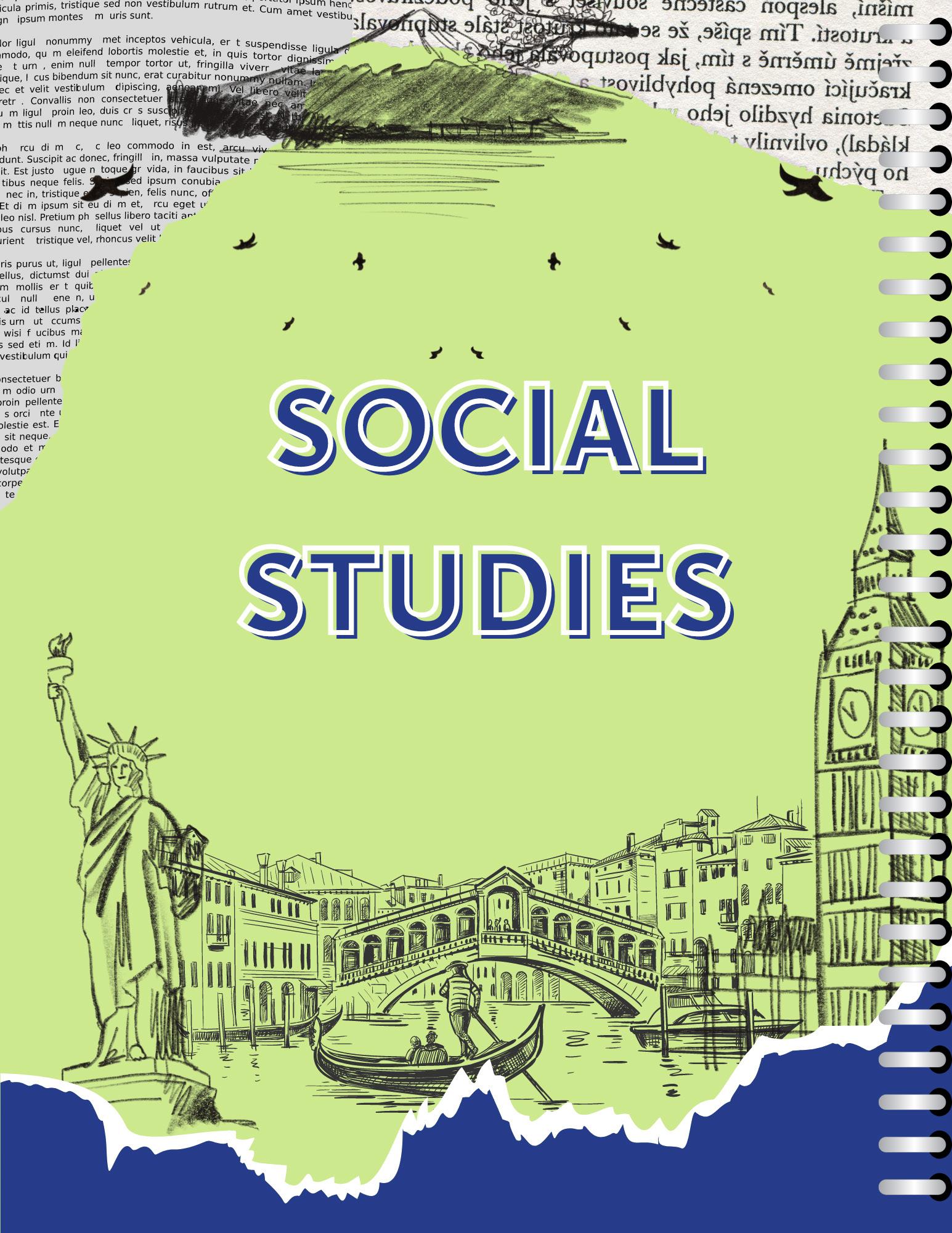
40
SOCIAL STUDIES
CHAIR: SARAH NEWMAN
The social studies department strives to teach students how to think, not what to think, as we prepare students for the responsibilities of citizenship. By helping students draw connections between the content and their world, we foster greater global awareness and literacy. Not only do we teach skills such as critical thinking, historical analysis and writing, but also we endeavor to show and engender a sincere enthusiasm for learning.

[352] ANCIENT WORLD HISTORY. GRADE 9
This full-year course for ninth graders traces the growth of civilization from its roots in the early river valley settlements to the dawn of the Renaissance and the Age of Exploration. Students examine belief systems, ways of life, governmental structures, art, architecture, and innovations in Asia, Africa, Europe, and the Americas. Students do not just study history but also get involved in it through handson activities. They hone research, interpretation, and presentation skills and analyze history to find connections among regions, as well as between time periods.
41
SOCIAL STUDIES
[360] UNITED STATES HISTORY. GRADE 11
This full-year course for juniors examines the major events, eras, and personalities that have shaped and continue to impact the political, economic, and social institutions of America from its founding to the modern, post-9/11 world. The evolution of American social and cultural values is analyzed, as well as the growing international involvement and commitments of the United States abroad. The growth of the arts, literature, social reform movements, extension of civil rights, the labor movement, and government are also highlighted with special emphasis on the development of critical thinking skills.
[370] UNITED STATES GOVERNMENT. GRADE 12
This full-year course for seniors is designed to promote civic awareness and responsibility and introduce the institutions through which the national government functions. Students examine the principal processes through which public policy is conceived and established and examine the basic structure and theories of the American economic system. Major topics include the Constitutional underpinnings of democracy and federalism in the United States; the nature of governing bodies, civil rights, and civil liberties; current domestic and foreign policy concerns of the United States; and the relationship between democracy and the free enterprise system. The primary objective is to equip students with the knowledge and critical insight necessary to contribute to our democracy and to maintain intellectual respect for other forms of government.
SOCIAL STUDIES DEPARTMENT ELECTIVES
[340] MODERN WORLD HISTORY. GRADES 10–12
This course provides an in-depth study of the history, politics, economics, religion, and culture of the world from the Renaissance to the present. Students expand their knowledge of the traditions, movements, people, and events that have shaped our world. Emphasis is placed on writing, critical thinking, and map skills. Students continue to analyze historical processes and connections between and among geographic regions and time periods.
[379] ADVANCED PLACEMENT WORLD HISTORY. GRADES 10–12
PREREQUISITE—A minimum grade of 88 (84 if AP) in previous history and English courses
This course invites students to take a global view of historical processes and contacts between different societies and over time. The themes of interaction between humans and the environment, development and interaction of cultures, state-building and conflict, creation and interaction of economic systems, and the development and transformation of social structures link the time periods together. Students develop analytical and evaluative thinking skills and explore techniques used to interpret primary and secondary sources. Additionally, students delve into some of the major topics debated among historians. The basic framework of the course is chronological, though overarching themes and fundamental questions guide the study. All AP World History students are required to take the AP exam in May.
42
SOCIAL STUDIES
[373] ADVANCED PLACEMENT HUMAN GEOGRAPHY. GRADES 10–12
PREREQUISITE—A minimum grade of 88 (84 if AP) in previous history and English courses
AP Human Geography introduces students to the systematic study of patterns and processes that have shaped human understanding, use, and alteration of Earth’s surface. Students employ spatial concepts and landscape analysis to examine socio-economic organization and its environmental consequences. They also learn about the methods and tools geographers use in their research and applications. The curriculum reflects the goals of the National Geography Standards (2012). The course is equivalent to an introductory college-level course in human geography. All AP Human Geography students are required to take the AP exam in May.
[369] ADVANCED PLACEMENT UNITED STATES HISTORY. GRADE 11
PREREQUISITE—A minimum grade of 88 (84 if AP) in previous history and English courses
This course places an emphasis on analyzing primary documents, mastering historical writing, and developing interpretations of history that are rooted in fact. Students acquire factual knowledge of American history and develop the analytical skills necessary to assess and interpret historical data. Additionally, students explore the major interpretations of history that have been offered by professional historians and assess how these theories conflict. Course content covers pre-Columbian native societies through the modern War on Terror, with an emphasis on social, political, and economic history. All AP U.S. History students are required to take the AP exam in May.
[389] ADVANCED PLACEMENT UNITED STATES GOVERNMENT AND POLITICS. GRADE 12
PREREQUISITE—A minimum grade of 88 (84 if AP) in previous history and English courses
This course focuses on the U.S. constitutional system based on an understanding of philosophy, political parties, interest groups, mass media, political beliefs and behaviors, national institutions, and policy-making processes. Students examine topics in American government using an interactive approach that involves panel discussions, simulations of congressional hearings, the budget process, nomination of federal judges, current events, the writing of legislation and media analysis, as well as lecture. All AP Government students are required to take the AP exam in May.
[365] AMERICAN POLITICAL PROCESS. [FIRST SEMESTER] GRADES 11–12
This one-semester course emphasizes the national political system and its impact on the federal government. Students analyze the foundations of the political parties, the nomination process, voter demographics and electoral/election strategies. Assessment includes position papers, tests, quizzes, presentations and class participation.
[367] INTERNATIONAL STUDIES. [FIRST SEMESTER] GRADES 11–12
In this one-semester course, students examine major global trends and issues by drawing on lessons and sources from multiple content areas: politics, economics, linguistics, religion, agriculture, health sciences, and others. Students focus on the causes and effects of globalization (“global citizens”) and take stock of the advantages and drawbacks globalization has created. The course also includes preparations for required participation in a fall Model UN conference.
43
SOCIAL STUDIES
[362] ECONOMICS. GRADES 11–12 [SECOND SEMESTER]
This course explores economics from the viewpoints of the individual consumer and small business owner to those of the global marketplace. Students study the laws of supply and demand, forms of business, labor unions, government finance and economic influence, money and price controls, and inflation and deflation. The course develops an economic way of thinking that helps students explore the connections among history, politics, and economics.
[357] PSYCHOLOGY. GRADES 11–12
The purpose of this year-long course is to introduce students to facts, principles, and phenomena associated with the field of psychology. Topics covered include basic psychological processes, human development, social psychology, and psychological problems, disorders, and treatment. Psychology seeks to understand why we think, feel, and behave as we do. The course will expose students to contemporary research in the field of psychology to help broaden their worldview and focus on developing critical thinking skills related to human behavior. This elective does not fulfill the advanced diploma’s requirement as a fourth year of history.
[359] AP PSYCHOLOGY. GRADES 11–12
Prerequisite—a minimum grade of 88 (84 if AP) in previous history and English courses
The purpose of this year-long course is to introduce students to the systematic and scientific study of the behavior and mental processes of human beings and other animals. Students are exposed to the psychological facts, principles, and phenomena associated with each of the major subfields within psychology. Students also learn about the methods psychologists use in their science and practice. This elective does not fulfill the advanced diploma’s requirement as a fourth year of history. All AP Psychology students are required to take the AP exam in May.
44
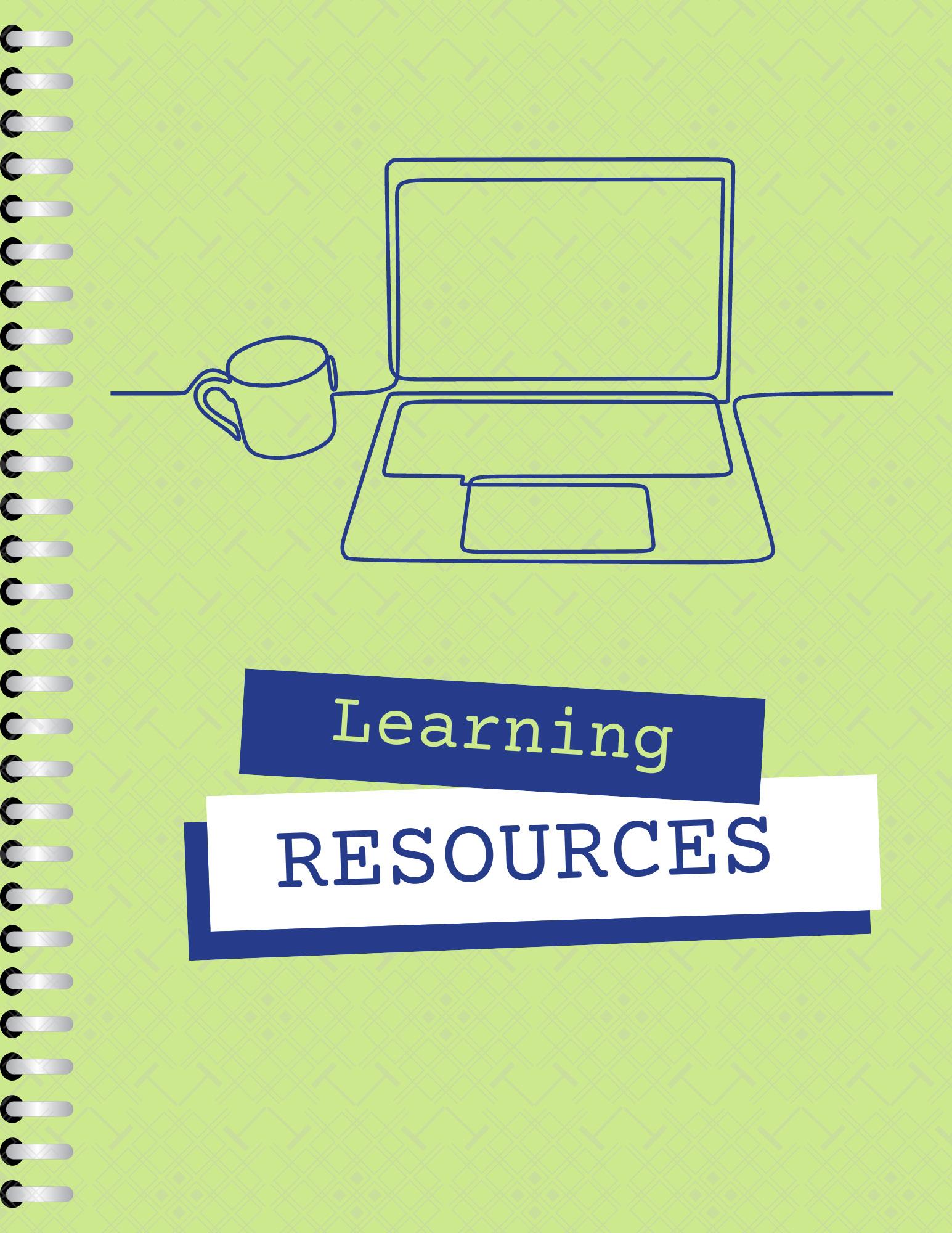
45
LEARNING RESOURCE SERVICES
DIRECTOR OF LEARNING RESOURCE SERVICES: LESLIE
GULAK
The Learning Resource Center (LRC) offers a variety of academic support services for students in grades 6-12. These resource programs provide individual and small group academic and behavioral support for students who need assistance with specific content areas, reading, study skills, motor or listening skills, organization and time management. Learning specialists and tutors in the LRC collaborate with classroom teachers to help them understand students’ learning challenges, needs and strengths and to facilitate accommodations for students with documented learning disabilities. Students who are enrolled in the LRC for tutoring and other support services pay an additional fee (separate from tuition), which covers the cost of providing individualized support and instruction. Learning Resources courses are non-credit-bearing.
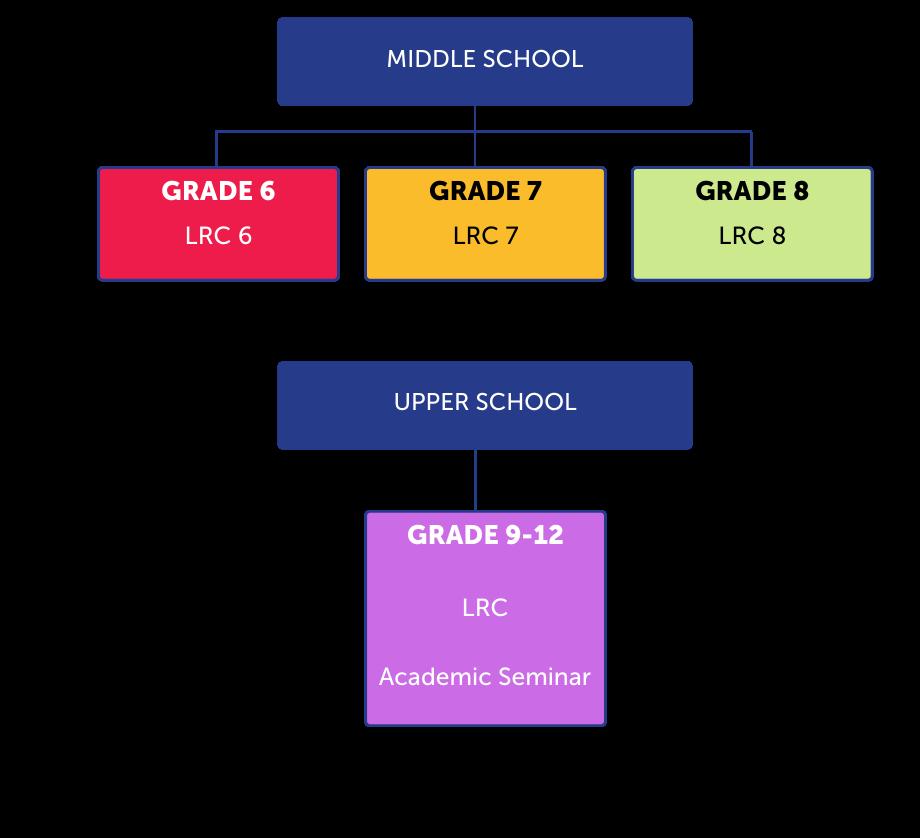
Students who receive classroom accommodations have documented learning disabilities that have been identified by a psychologist or learning disabilities specialist through psycho-educational or neuro-psychological testing. These accommodations, which may include extended time, oral testing, testing away from the group, a spelling waiver, or the use of a laptop computer or calculator, are only provided for students with educational testing completed within the past three years that clearly documents the disability and its impact on the student’s learning. It is important to have educational testing updated every three years as students’ learning ability and accommodation needs often change over time. Testing updates help classroom teachers and the resource staff better understand and assist with students’ learning needs, and they are ultimately required by the College Board, ETS (Educational Testing Service) and the ACT in order to request accommodations for College Board and ACT testing.
LEARNING RESOURCE SERVICES
[995] LRC. GRADES 9-12
Students who are enrolled in the LRC receive small group tutoring during a daily class period that includes assistance with study skills, time management, test-taking skills and organization, content tutoring and review and any prescribed classroom accommodations. LRC learning specialists communicate with classroom teachers and parents on a regular basis. In order to be eligible for LRC support, students must have educational testing and/or documented learning differences. Each student in the LRC receives a learning plan, created in consultation with the student and family. Note: This service is offered for an additional fee.
[997] ACADEMIC SEMINAR. GRADES 9-12
The Academic Seminar is designed to empower students with essential tools and strategies needed to thrive academically. Students will engage in a dynamic learning environment focused on developing effective study habits and time management skills and fostering a growth mindset. This course is open to students in grades 9-12 by school recommendation and will provide students with dedicated time to focus on developing and applying study skills as they complete their academic work. Interactive lessons, discussions and practical exercises will be incorporated to reinforce executive functioning skills necessary to be successful throughout their time at Norfolk Collegiate. Note: This service is offered for an additional fee.
47
INDEPENDENT STUDY
INDEPENDENT STUDY
See page 50 for Independent Study Application.
Academically strong, qualified students who wish to undertake serious study in an area not covered by the school’s curriculum may elect to complete an independent study. The independent study program offers two paths. Students must take a study hall bell regardless of which option is selected. All independent studies must be approved by the faculty sponsor, academic department chair, head of upper school, director of instruction and parent or guardian.
OPTION 1: The student elects to take a course at the online school One Schoolhouse. All courses are asynchronous, meaning there are no scheduled whole-class meeting times, but meetings with the online teacher are expected each week. An addendum from One Schoolhouse is attached to the transcript; grades will not factor into the GPA.
OPTION 2: The student proposes a 0.5-credit, pass/fail independent study course of their own design. In order to be considered for such study, a student must have exhausted all course offerings in the academic area. The student should design and document the features of the proposed program of study and choose a faculty mentor. Independent study courses must be academic in nature, undertaken under the auspices of an academic department and supervised by a member of the faculty.
48
INDEPENDENT STUDY
ONLINE COURSE GUIDELINES
See page 50 for One Schoolhouse Application.
Norfolk Collegiate provides upper school students with a challenging curriculum featuring a diverse array of courses known for their extensive and comprehensive offerings. Starting with the 2024-25 school year, students will have the opportunity to enhance their coursework through online classes. One Schoolhouse is a coalition of more than 200 prominent independent schools nationwide collaborating to deliver high-quality online courses taught by expert teachers specializing in their respective subjects. Students gain access to a broad range of courses, including APs, and benefit from the consortium’s dedication to excellence, small class sizes and the establishment of personal connections with peers across the country.
Application
Students wishing to participate in the One Schoolhouse course offerings must apply and be approved for an independent study before enrolling in the course. See below for independent study application form.
Financial
Students taking an online or external course are responsible for the associated course fees. As an affiliate member of One Schoolhouse, the Norfolk Collegiate business office will bill families directly for One Schoolhouse courses. One Schoolhouse tuition must be settled in full before the commencement of the school year. Tuition for the 2024-25 school year is $1,880 for full-year courses and $1,135 for semester courses.
Workload
Online and external courses are most suitable for students who demonstrate self-motivation, self-advocacy and the ability to work independently. Students engaged in a year-long online course should anticipate dedicating 8-10 hours per week. Students who sign up for an online course must have a corresponding study hall as part of their schedule.
AP Exams, Credit, Transcripts, GPA
Students undertaking an AP online course are required to register and sit for the AP exam through the school.
An online course cannot be applied to fulfill Norfolk Collegiate’s graduation requirements. Any credits earned through the successful completion of an online course will not be recorded on the Norfolk Collegiate transcript. Instead, Norfolk Collegiate will append a separate transcript from the online provider.
Grades achieved in successfully completed online courses will not be factored into Norfolk Collegiate’s GPA and, therefore, will not contribute to eligibility for Honor Roll, National Honor Society, or other accomplishments dependent on GPA.
Honor Code and Responsible Use
Norfolk Collegiate students are expected to comply with the academic and behavioral policies and expectations of Norfolk Collegiate and the online course provider.
Available Courses
A full list of course offerings can be found at oneschoolhouse.org
49
INDEPENDENT STUDY APPLICATION
This form must be completed by the student and returned to the associate director of college counseling & academic advisor before the independent study begins. It is the student’s responsibility to keep a copy of this form.
APPLICATION DEADLINES:
One Schoolhouse courses: August 15, 2024
Independent study fall semester: September 6, 2024
Independent study spring semester: January 17, 2025
Student name:
Grade:
Faculty sponsor’s name: For One Schoolhouse courses, the faculty sponsor is Mrs. Val Ortiz.
Starting date:
Select one
ONE SCHOOLHOUSE COURSE
Title:
Attach the following information:
Completion date:
1. Reason for course: List specific goals for what you want to accomplish through this course and what place this course holds in your overall course of study at Norfolk Collegiate.
2. Preparation for independent work: Explain how you are prepared for the independent work level required for an asynchronous online course.
SELF-DESIGNED INDEPENDENT STUDY COURSE
Title:
Attach the following information:
1. Plan of study: List specific goals for what you want to accomplish through your study.
2. Preparation for independent work: Explain how you are prepared for the independent work level required for an independent study course.
3. Resources and information to be used for your study: Examples include textbooks, Internet sources, interviews, internship/volunteer activities, observations, etc.
4. Method of assessment: How you will demonstrate that you have accomplished your goals.
Required signatures: Indicating approval to begin the course or study.
Faculty Sponsor:
Department Chair:
Head of Upper School:
Director of Instruction:
Parent/Guardian:
Date:
Date:
Date:
Date:
Date:
50
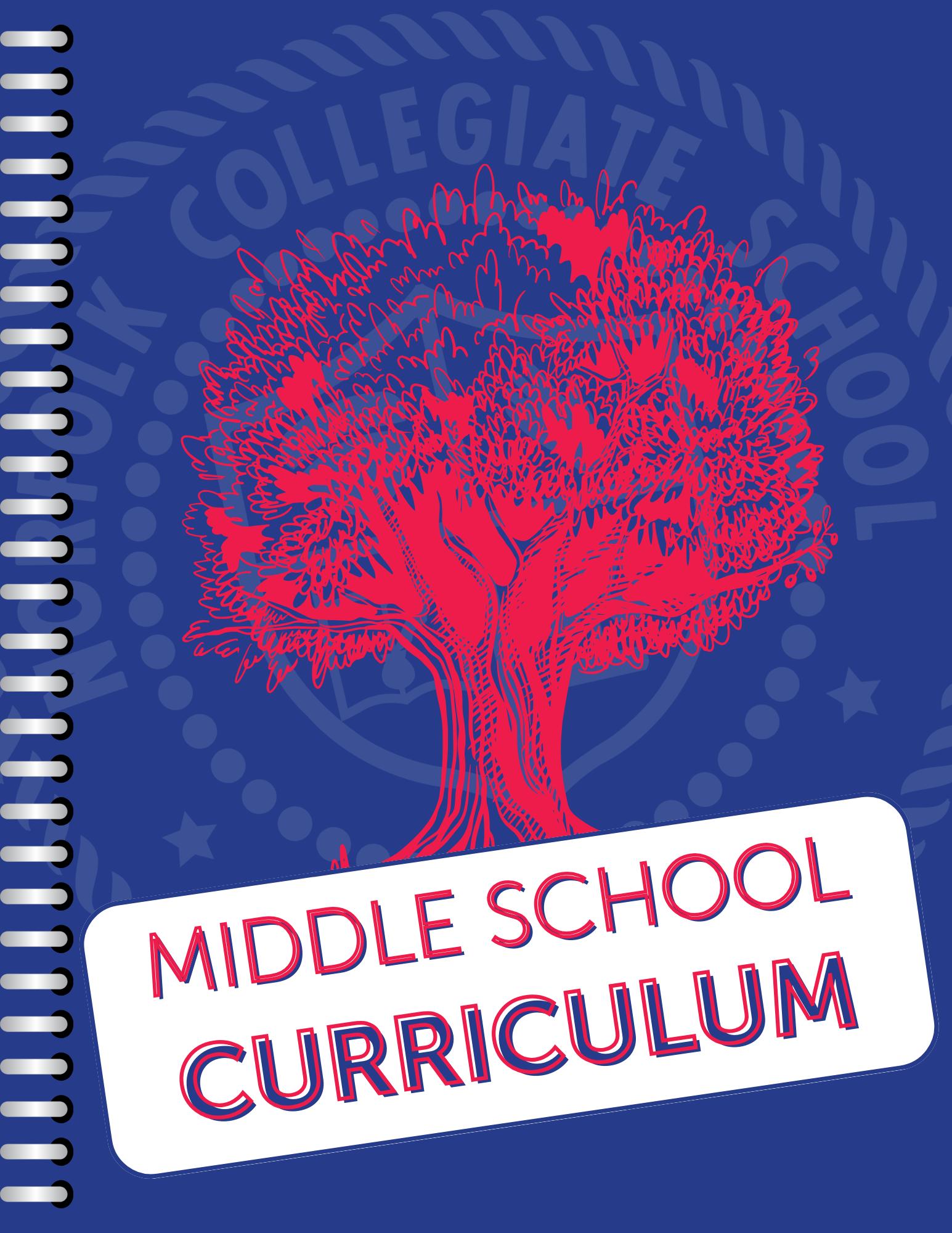
51
MIDDLE SCHOOL CURRICULUM
SIXTH GRADE
The core curriculum consists of English, Math, Science, Social Studies, and Health/PE. In addition, every sixth-grade student takes:
• World Languages | One semester
• Computer Science Discovery | One semester
• Visual and Performing Arts Explorations | Two semesters Strings is offered as an optional, additional elective course in the mornings
SEVENTH GRADE
In addition to the core curriculum (English, Math, Science, Social Studies, Health/PE), seventh-grade students take Spanish 7, French 7, or Latin 7. Seventh-grade elective courses include:
• Art
• Band
• Chorus
• Design Thinking
• Strings is offered as an optional, additional elective course in the mornings
EIGHTH GRADE
The core curriculum includes English, Math, Science, Social Studies, Health/PE, and a Modern or Classical Language. Eighth-grade elective courses include:
• Art
• Band
• Chorus
• Design Thinking
• Strings is offered as an optional, additional elective course in the mornings
52
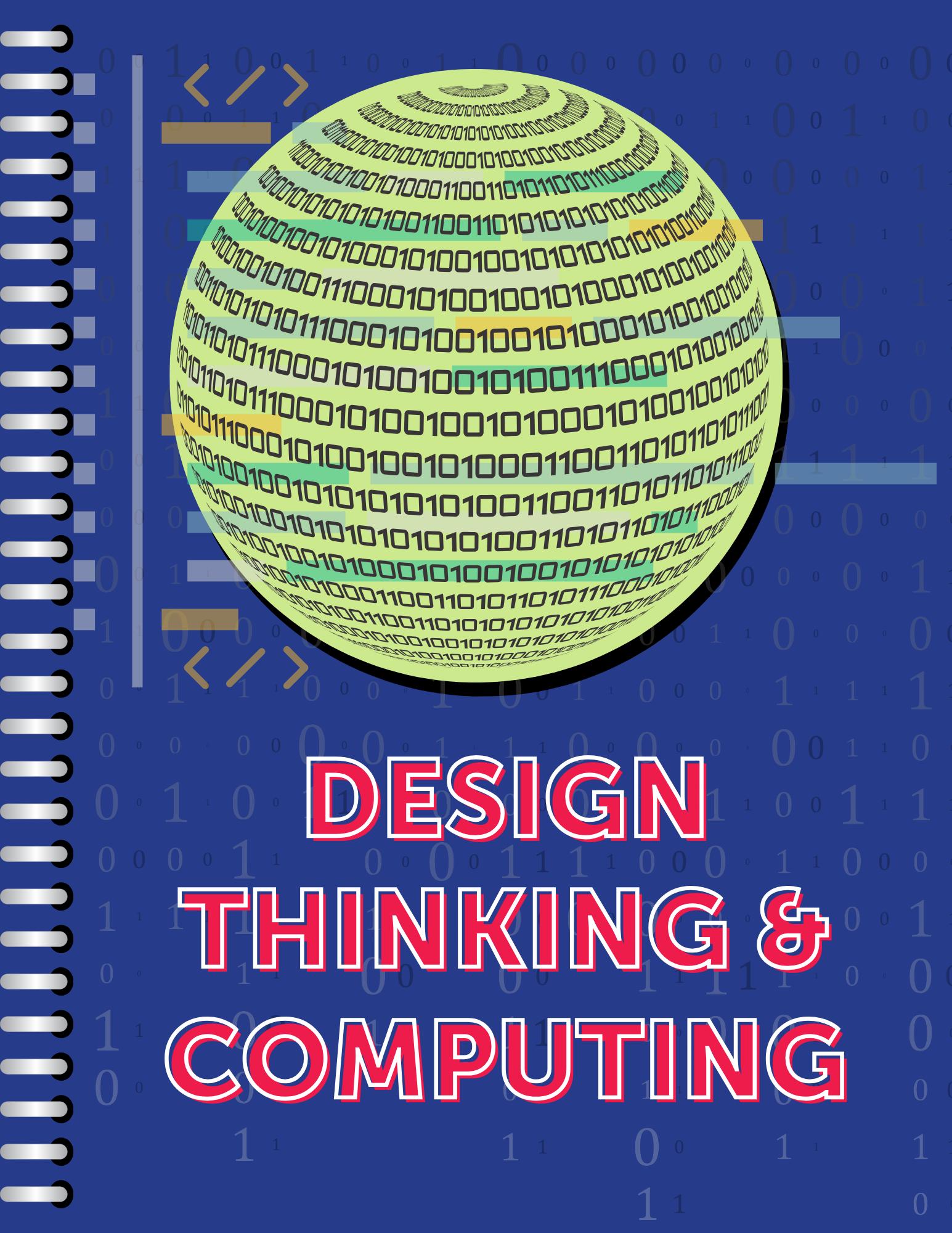
53
DESIGN THINKING & COMPUTING
CHAIR: BRENDAN HOYLE
The mission of the design thinking and computing department is to provide students the opportunity to pursue robust coursework that combines design, production, and critical communication skills. These courses take place within a collaborative, creative, interdisciplinary framework that prepares students to communicate their ideas and opinions in an increasingly complex technological society.
COMPUTER SCIENCE DISCOVERY introduces students to computer science through programming graphics. Students learn to draw and animate shapes in the programming language Python, use the design thinking process to create scenes, animations and games, and program a pocket-sized computer.
DESIGN THINKING 7/8 introduces students to the design thinking process through a course of hands-on, projectbased learning. Students apply these skills to a variety of real-world problems, including projects developed for local, state, and national design thinking competitions.

54
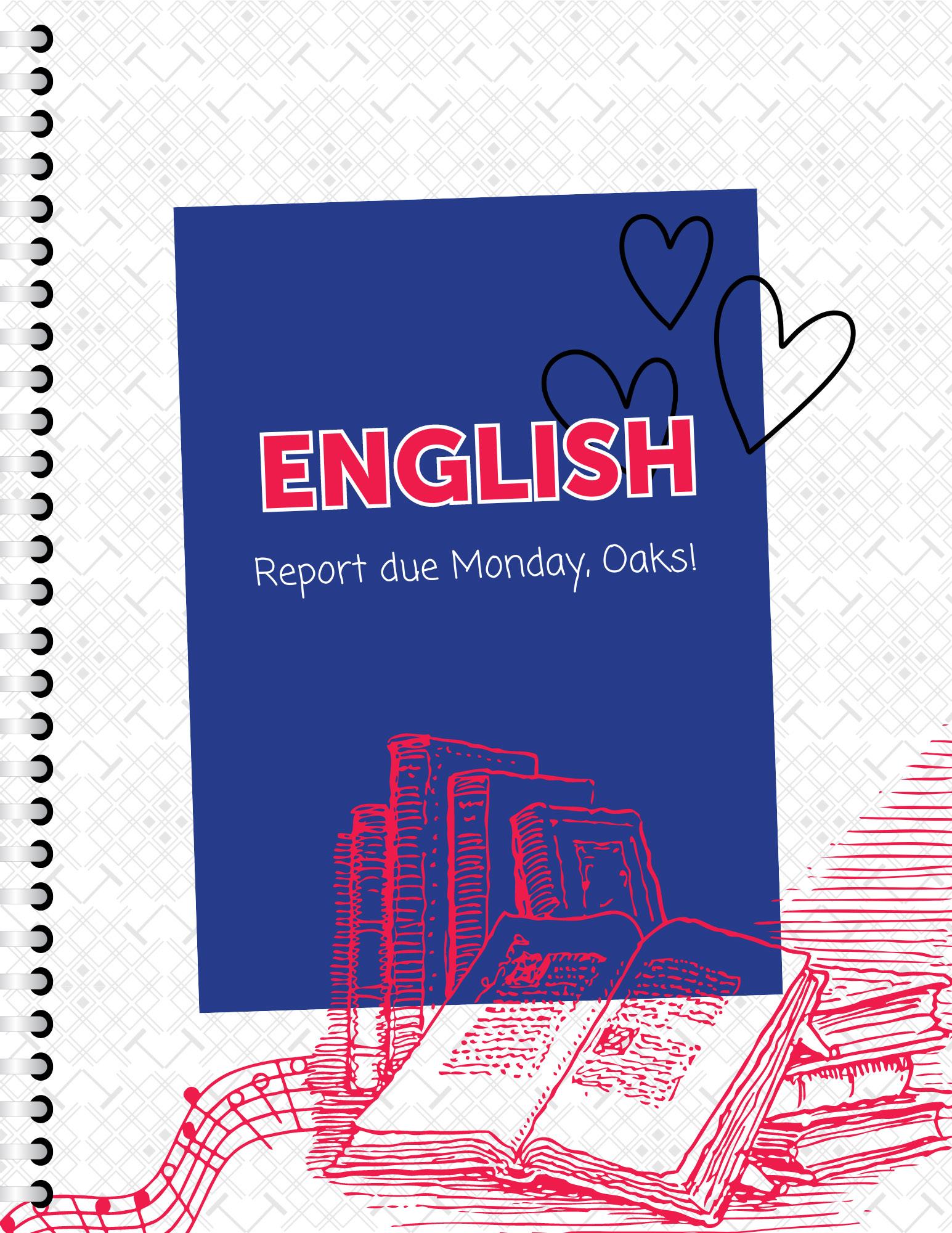
55
ENGLISH
CHAIR: AMY ROBB
The English department is dedicated to fostering an appreciation of literature while developing self-driven critical thinkers, readers, writers, and speakers through a challenging, student-centered curriculum. The goal of the English department is to develop students as critical readers, writers, and thinkers who will be lifelong learners. Through a novels-based curriculum, students learn to respond to literature, build a broad vocabulary, speak with confidence, and write clear, insightful essays, reports, stories, and poems.
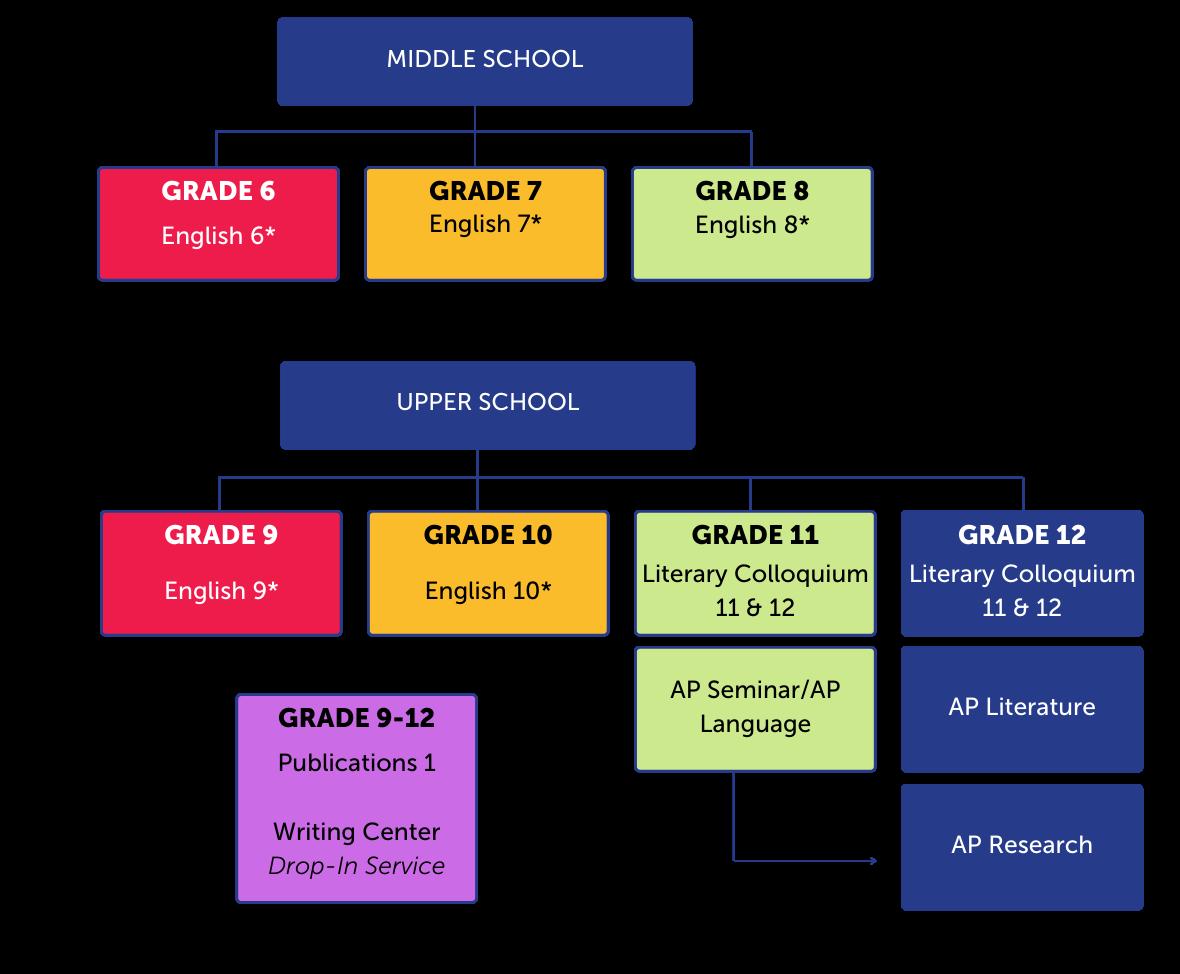
56
ENGLISH 6 is all about the power of stories. With each book, students read, discuss, weigh their understanding, and develop their own meaning. Reader response journals, directed essays, papers, tests, and projects are used to demonstrate and measure student progress as analytical readers and thinkers. Book genres read include short stories, realistic fiction, historical fiction, fantasy/science fiction, non-fiction, and poetry. Language skills such as spelling, vocabulary, and grammar are developed through a reading and writing workshop approach and an individualized program of vocabulary development.
ENGLISH 7 focuses on literary appreciation and analysis, composition, grammar, and vocabulary. Examination and analysis of novels from the full range of literary genres—including non-fiction, historical fiction, realistic fiction, fantasy/science fiction, adventure/survival fiction, plays, poetry, and graphic novels— are the center of classroom discussion, the focus of writing assignments, and the source for grammar instruction. The course also includes an individualized program of vocabulary development.
ENGLISH 8 incorporates the study of reading, writing, language, and vocabulary through the study of literature. Students explore many types of literature including plays, short stories, novels, and poetry. Students are encouraged to make connections between literature and their own lives through class discussions, journals, essays, and a variety of interactive projects and learning activities, including an individualized program of vocabulary development.
57
ENGLISH
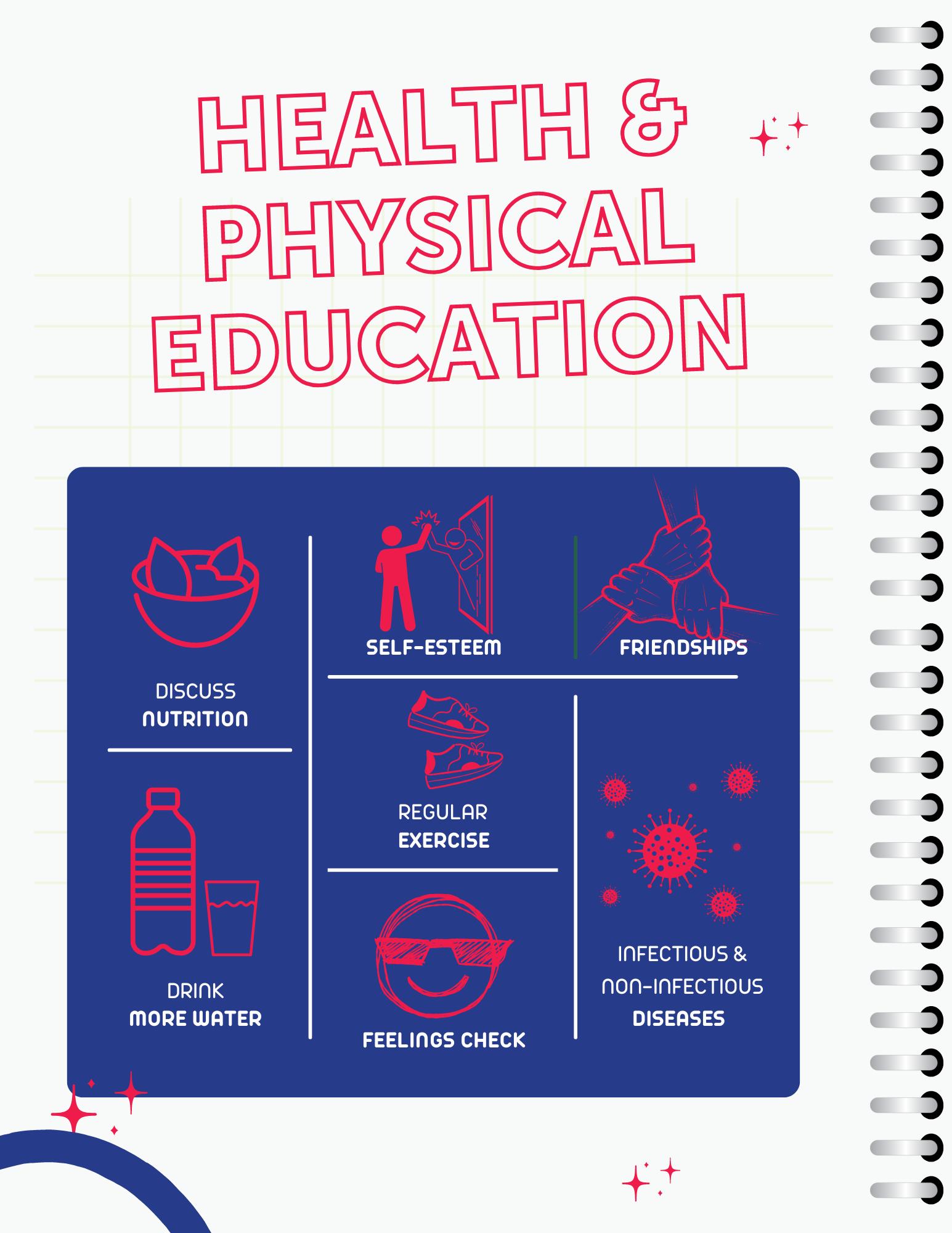
58
HEALTH & PHYSICAL EDUCATION
CHAIR: JON HALL & SUSIE POTTER
The health and physical education program supports students in reaching their highest potential for health, vitality, and wellness and empowers them to sustain regular, lifelong physical activity as a foundation for a healthy, productive, and fulfilling life.
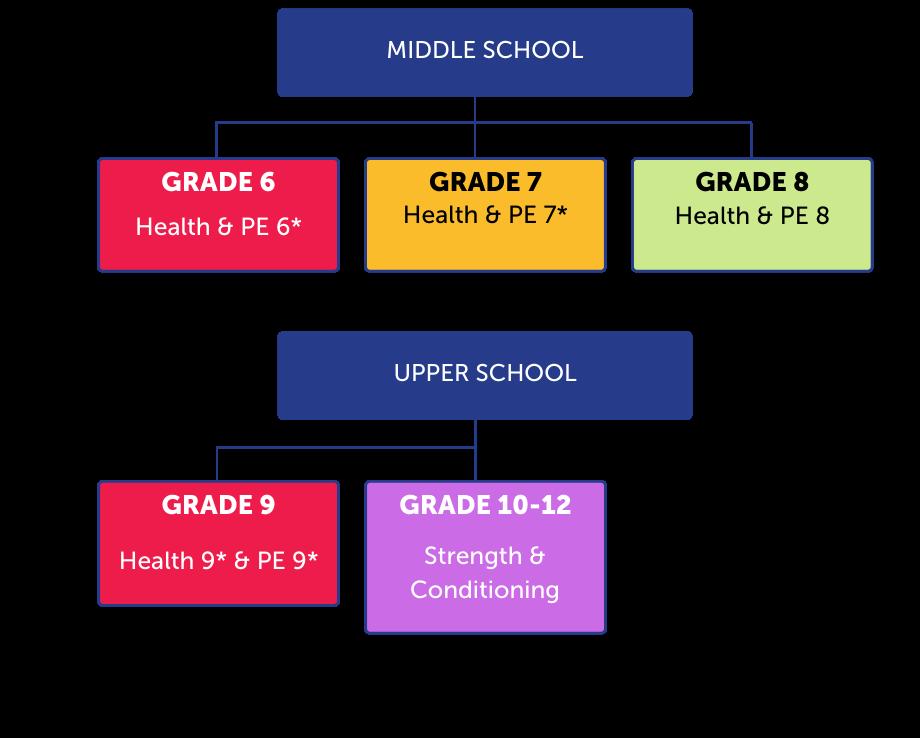
MIDDLE SCHOOL PHYSICAL EDUCATION 6/7/8 is a full-year course taken each year. It is designed so all students gain a greater understanding of physical fitness, while concentrating on their own personal fitness goals. Throughout the year students are introduced to a variety of fitness, recreation, individual, and team sport activities and games. Students are also introduced to leadership techniques and practices and have the opportunity to lead the class in a specific game and/or activity.
MIDDLE SCHOOL HEALTH 6/7/8 is a full year complement to the physical education program.
In the sixth grade, course topics include self-esteem; difficult feelings; friendships; nutrition; disease prevention; alcohol, tobacco and other drug issues; and human growth and development.
In the seventh grade, students study health topics including health and wellness, decision- making, self-esteem, the different body systems, and different diseases.
In eighth grade, students study conflict management, preventing abuse and violence, infectious and non-infectious diseases, consumer health, and health and the environment.
59
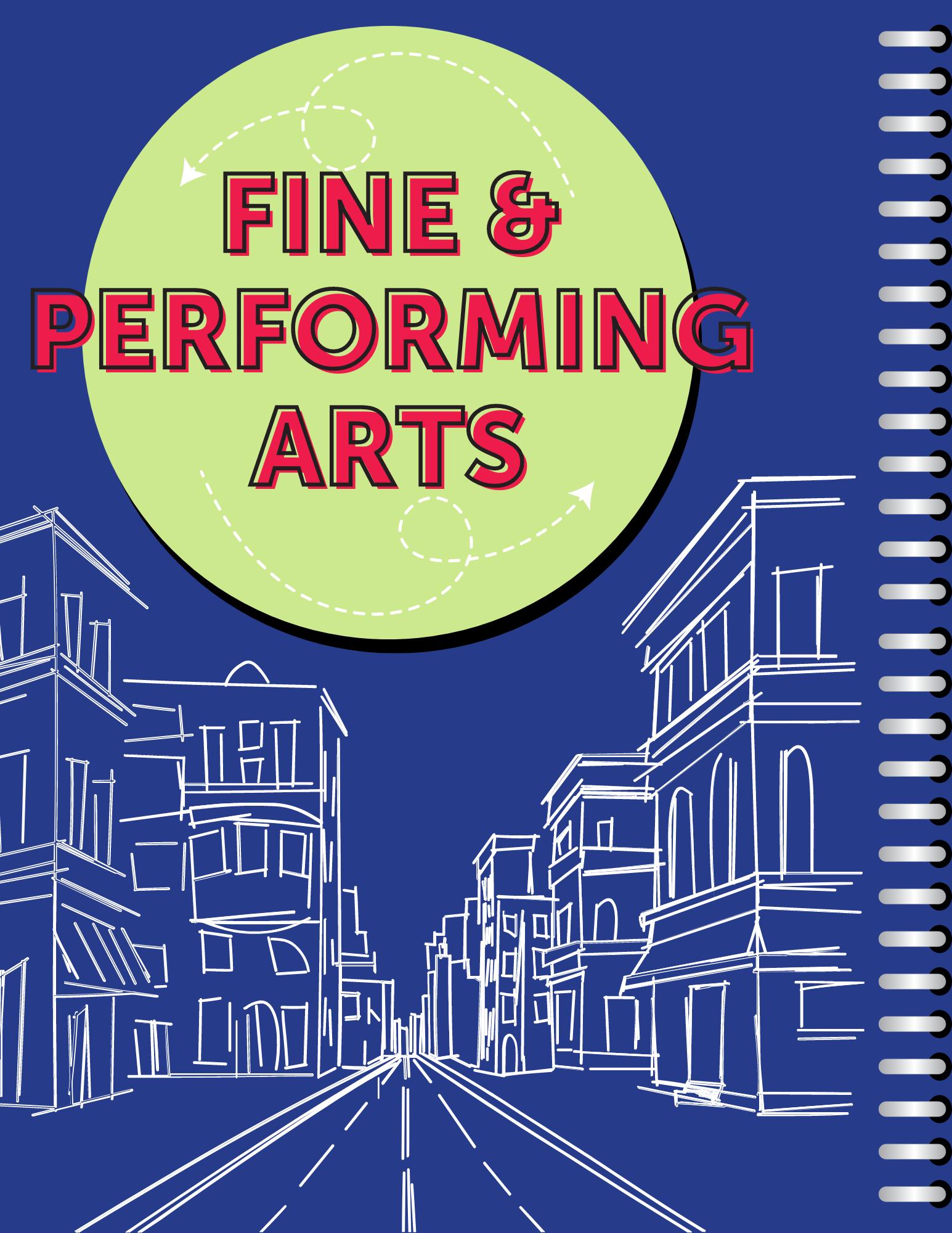
60
FINE & PERFORMING ARTS
CHAIR: BRENDAN HOYLE
The mission of the fine and performing arts department is to discover, encourage, inspire, and showcase each student’s unique talents. The program seeks to nurture and celebrate each student’s diverse gifts through engaging, innovative instruction that enhances the understanding and appreciation of art, music, and theater as they relate to the student, the school, and the world at large.

VISUAL AND PERFORMING ARTS EXPLORATIONS
gives sixth-grade students the opportunity to experience both the visual and performing arts at Norfolk Collegiate, with the goal of developing a well-rounded appreciation for all aspects of fine and performing arts. This course is divided into two semesters, with all students taking one semester of visual art and one semester of performing art.
Sixth-grade visual art is an overview of the processes and terminology of various types of art. Students explore several basic areas of art, art criticism and evaluation, and art history. The principles and elements of design are introduced and guide students in producing various pieces of artwork while exploring multiple media. This semester-long course enables students to recognize terminology, basic materials, and techniques in both two- and three-dimensional design. Students plan projects before carrying them out, using creative problem-solving to design and participate in self and peer critiques. Each student creates personal works of art that highlight their understanding of the elements of art. Project assignments stress craftsmanship, following the assignment guidelines, and creativity. Each student documents their artwork using a digital portfolio.
61
Sixth-grade performing art is an overview and exploration of various elements of music and performance. Students study the basic elements of music in addition to introductory areas of music history, music reading, listening, group performance skills and etiquette, examining the world through music, and music as a method of storytelling. This semester-long course enables students to explore various aspects of music from the perspectives of a performer, a listener, and an observer. Students develop skills in music listening, analysis, notation, and vocabulary, and explore elements of music history and its connection to the human experience. Students study how music and storytelling come together in forms such as opera, musical theater, movie scores, video game scores, and others. Students have the opportunity to experience participating in band, chorus, and theater ensembles.
ART 7/8 is an overview of the processes and terminology of various types of art. Students will explore several basic areas of art, art criticism and evaluation, and art history. The principles and elements of design will be introduced and will guide students in producing various pieces of artwork while exploring multiple media.
BAND 7/8 offers a unique training and performing environment for young band students. The band is carefully trained in the basics of playing and reading music starting at a level of difficulty comfortable for the ensemble at the beginning of each year. The band performs throughout the year at several school and community events. The band is open to those students who are experienced musicians, as well as those with little to no experience.
CHORUS 7/8 reinforces basic musicianship skills in vocal production and provides an opportunity for creative self expression through public performances both in the school and the community. The chorus is open to those students who are experienced musicians, as well as those with little to no experience. Strings 6/7/8 focuses on improving students’ skills with the violin, viola, cello, and bass and the students’ ability to play with a group. Beginners as well as advanced students are welcome, and all levels are accommodated. This course meets in the mornings before school.
PERFORMING
62
FINE &
ARTS
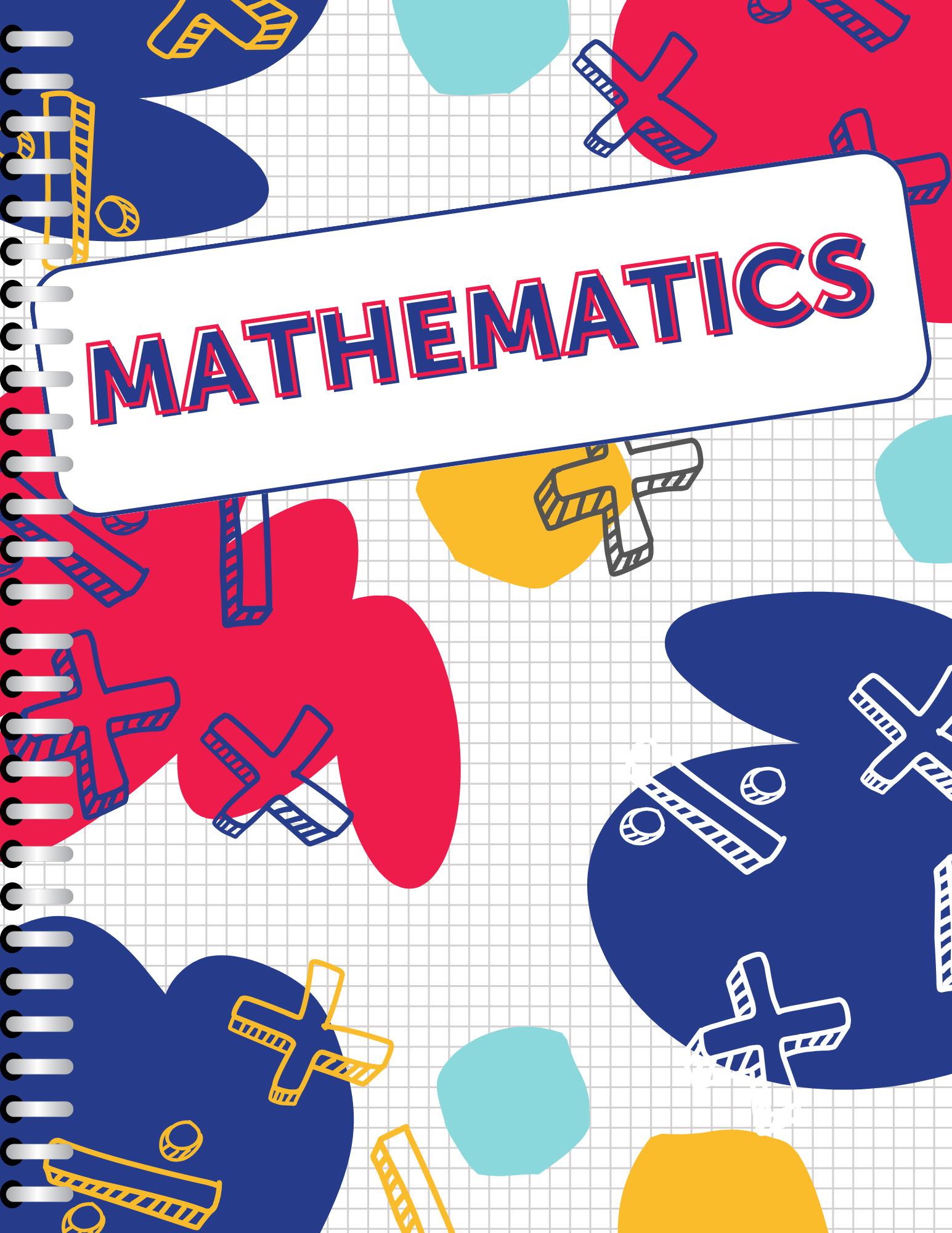
63
MATHEMATICS
CHAIR: REBECCA ZBOROWSKI
The mission of the math department is to educate a diverse body of students to the highest level that they can individually achieve. Challenging courses are offered at all levels of mathematics to ensure graduates will be able to seamlessly move into their studies in college. Math teachers use a variety of teaching methods, including the traditional mathematics teachings of Newton and Einstein, along with new and innovative methods in a collaborative and supportive environment. Sixth-, seventh- and eighth-grade students complete full-year courses in math that develop the ability to reason and think clearly.

MATH 6 focuses on the transition from concrete math to more abstract concepts. The Math 6 curriculum reinforces the skills of long division, fractions, estimation, and problem solving. Students are expected to compute and estimate accurately with fractions and mixed numbers using all operations. They are introduced to proportion, percentages, ratios, exponents, and algebraic equations with whole numbers and decimals. Students continue to explore both the standard and metric measurement systems, the properties of whole numbers and decimals, and plane geometry. Specific attention is given throughout the course to the skills needed for pre-algebra and Algebra I.
PRE-ALGEBRA briefly reviews the basic components and skills of general math such as computation, whole numbers, decimals, fractions, negative numbers, and inequalities. These skills are applied to percentages, measurement, geometry, statistics, and probability in real-world settings. After completing work on those concepts, specific attention is given to algebra skills needed before entering Algebra I.
64
MATHEMATICS
ALGEBRA I covers all fundamental concepts of algebra including a review of the use of variables and basic operations of addition, subtraction, multiplication and division, as well as equations and inequalities, linear equations, quadratic equations, exponential functions, and multiplying and factoring polynomial expressions. The TI-84 series graphing calculator is used in the presentation of functions, linear equations, quadratic equations, and inequalities.
GEOMETRY builds on basic algebraic skills to further develop and examine geometric concepts through models and coordinate geometry. Hands-on activities and formal proof methods are used to enhance the understanding of two- and three-dimensional reasoning and problem-solving skills. The TI-84 series graphing calculator is used to model basic theorems involving polygons and solid figures and in the introduction and application of trigonometric functions. Students must take Algebra I before taking Geometry.
65

66
MODERN & CLASSICAL LANGUAGES
CHAIR: MEAGAN STARKS
The modern and classical languages department encourages students to explore the languages and cultures of the world as a global community. Its mission is to nurture students’ innate sense of curiosity about humankind and to enlighten students regarding the importance of communication in foreign languages. Students will acquire a working knowledge of the history and foundation of these languages to better understand word origins, grammar, and mechanics.

WORLD LANGUAGES students explore the origins of how people communicate while also considering how communities and cultures are interconnected through different means of communication (i.e. body language, oral, written, tone, space, etc.). Through the study of Latin, French, & Spanish, students discover cross-cultural perspectives and learn how to be international-minded global citizens. The overarching goal is for students to understand the importance of being lifelong language learners and to provide an opportunity for 6th-grade students to explore a variety of languages prior to selecting one language to formally study for high school credit.
LATIN 7 is designed to prepare a middle school student to take an upper-school level Latin 1 (or other language course) in the 8th grade. Primary course elements include English grammar review, Latin grammar, and basic Latin vocabulary (200-250 words). Secondary elements will include ancient history, geography, and mythology.
67
MODERN &
SPANISH 7 is an immersive course that teaches students basic language patterns while exploring the cultures and communities of Spanish-speaking people. Teachers will use the language as a tool to help students make relevant connections to their own culture and to offer opportunities for exploration outside of the classroom. After completing this course, 7th grade students will be able to understand short phrases and sentences in Spanish. Students will also feel comfortable expressing themselves to others in everyday situations in the target language.
FRENCH 7 is an immersive course that teaches students basic language patterns while exploring the cultures and communities of French-speaking people. Teachers will use the language as a tool to help students make relevant connections to their own culture and to offer opportunities for exploration outside of the classroom. After completing this course, 7th grade students will be able to understand short phrases and sentences in French. Students will also feel comfortable expressing themselves to others in everyday situations in the target language.
FRENCH I students begin building a range of expression for both oral and written communication at the novice level. Along with emphasis on reading, listening, comprehension, writing, and speaking French, there is a beginning study of the basic grammatical structure of the language. The student’s knowledge of various French-speaking countries and their culture is expanded through class discussions and a variety of authentic materials. This course is offered for high school credit.
LATIN I emphasizes vocabulary, word families, translation of Latin into English, comparative grammar and classical mythology. By year’s end, students are able to translate Latin texts of reasonable complexity. Some Roman legends and basic Roman history of the monarchy and the Republic are also covered. Classical mythology units cover basic myths and mythic cycles of the Greeks and Romans. Cultural data includes clothing, food, housing, transportation, games and pastimes, Roman geography, and the Western traditions passed from Rome. This course is offered for high school credit.
SPANISH I introduces new vocabulary within contexts related to the students’ interests and activities. Approximately sixty to eighty words or expressions per chapter are introduced and stressed. Vocabulary is applied and practiced within one to two grammatical concepts per chapter. Computer-based vocabulary practice and oral exercises promote comprehension and initiate speaking practice. Written practice is provided through textbook activities, workbook activities, and original dialogues. Written and oral assignments supplement the cultural content that is introduced via live-streaming. This course is offered for high school credit.
68
CLASSICAL LANGUAGES
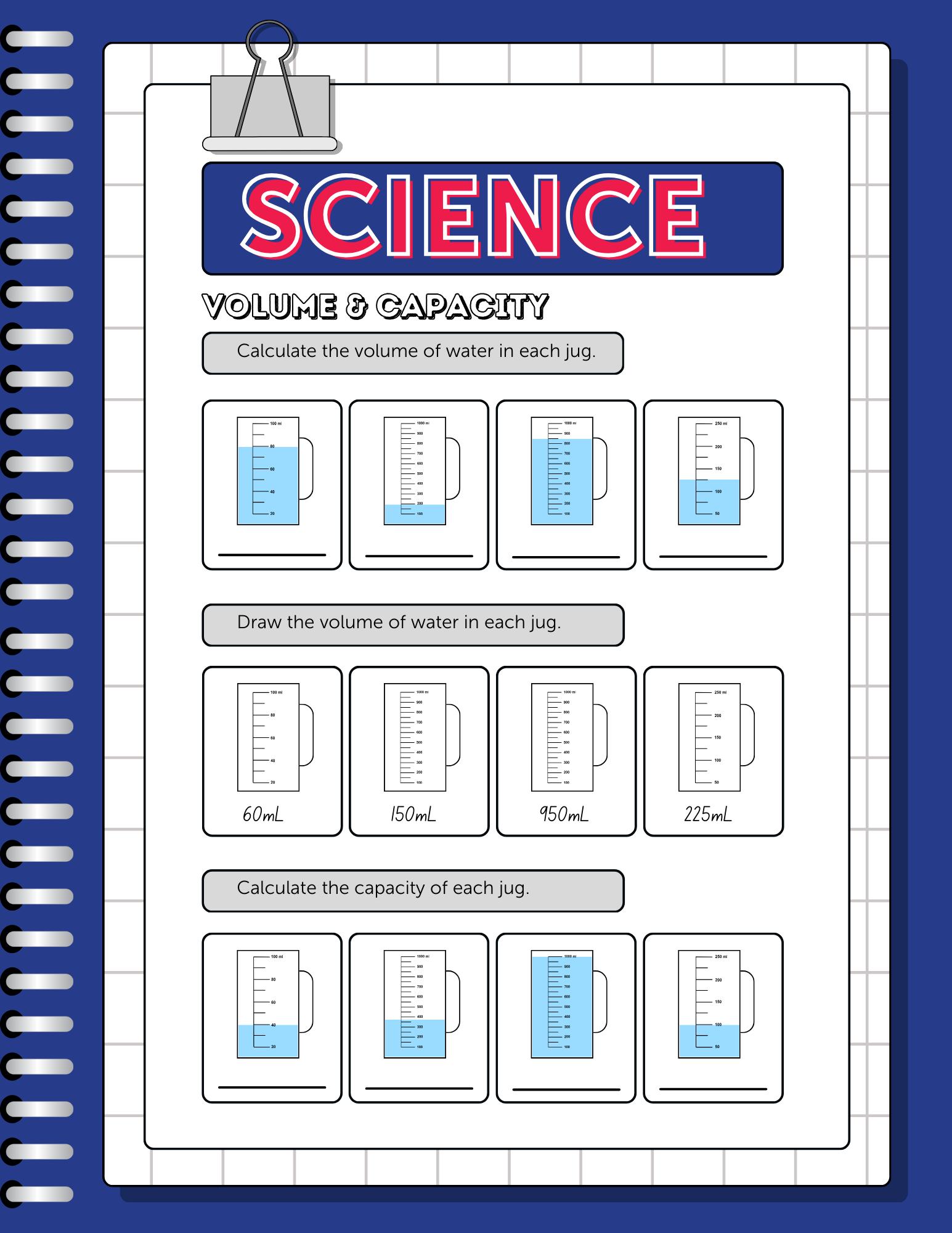
SCIENCE
CHAIR: DR. FRANK THOMSON
The mission of the science department is to produce scientifically literate students who are confident, independent thinkers capable of participating in and leading local and global scientific communities. Students develop an understanding of and passion for science through a variety of science courses across the scientific disciplines that meet the educational needs of all students. Students become analytical thinkers as they perform increasingly more challenging laboratory experiments designed to prepare them for college. The aim of middle school science is to build upon the inquisitive nature of the students developed in the lower school while beginning to formalize the curriculum in preparation for upper-level classes. Students and teachers work together in class on laboratory investigations that include inquiry and develop both critical thinking and problem solving skills.
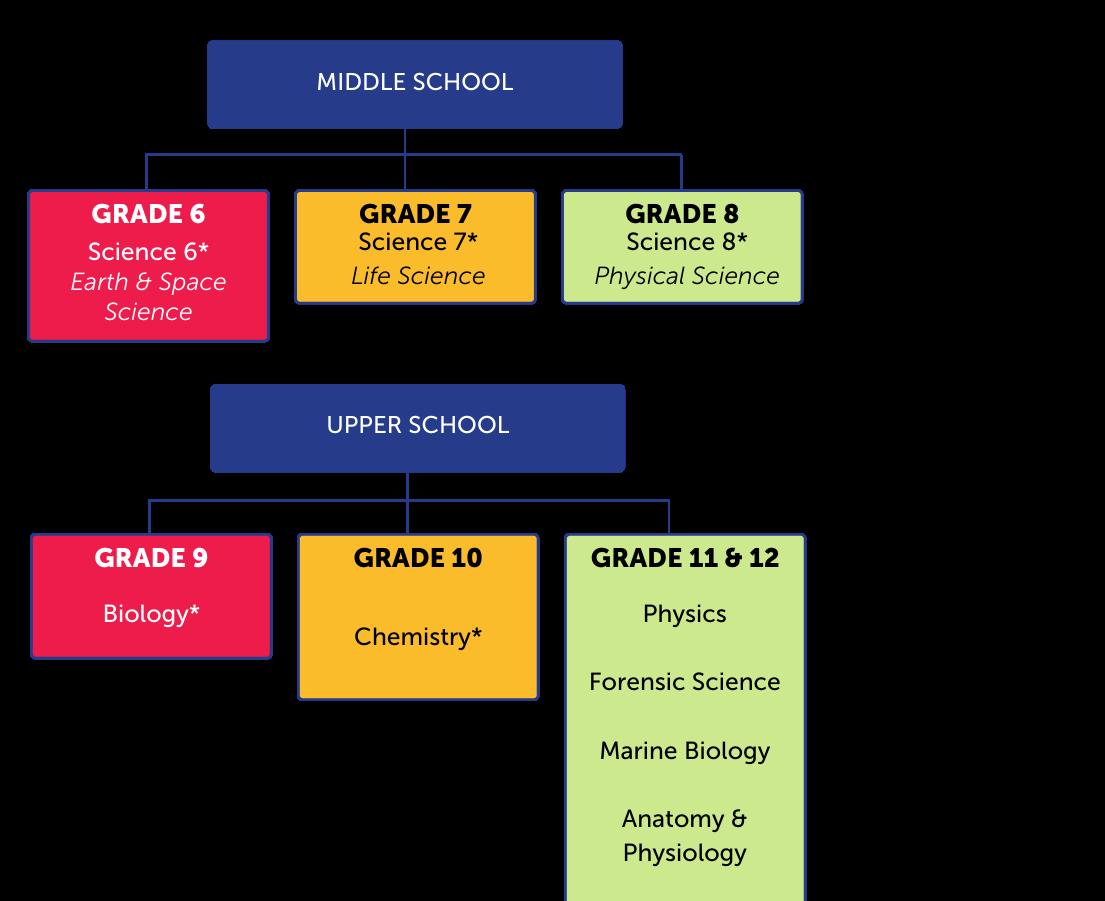
SCIENCE 6—Earth Science begins with a look at the formation of the universe. Students explore the solar system, the effects of the sun and the moon on the Earth, and changes in the planet due to natural occurrences. Students study the Earth by exploring a range of topics including the theory of plate tectonics, earthquakes, volcanoes, minerals, and the Earth’s surfaces. They end the year studying the atmosphere, weather patterns, and climate. Students develop organizational and study skills and improve note-taking ability. Hands-on exploration through labs and projects provides a concrete experience for the students.
70
SCIENCE
SCIENCE 7—Life Science is the study of living things and how they interact. The class begins with a study of cells, which includes an introduction to biotechnology, genetics, and current topics such as DNA, stem cells, and cloning. After a study of the human body the class investigates other life on Earth through a survey of the kingdoms, with expanded studies in the plant and animal kingdoms. Frequent hands-on laboratory investigations sharpen the critical thinking and lab skills begun in the sixth grade.
SCIENCE 8—Physical Science covers two main topics: physics and chemistry. Students study chemistry during the first semester and physics the second semester. Students study atomic structure and the role protons, neutrons, and electrons have on an element’s chemical properties. Students do not memorize the periodic table; however they become familiar with element placement in the table and how and why it became organized in its present day form. Physics is a hands-on science and students study motion and forces, energy and work, magnetism, electricity, and waves and apply this knowledge to everyday events in their lives. Students use their algebraic skills to solve for unknown variables such as speed, velocity, force, and work.
71
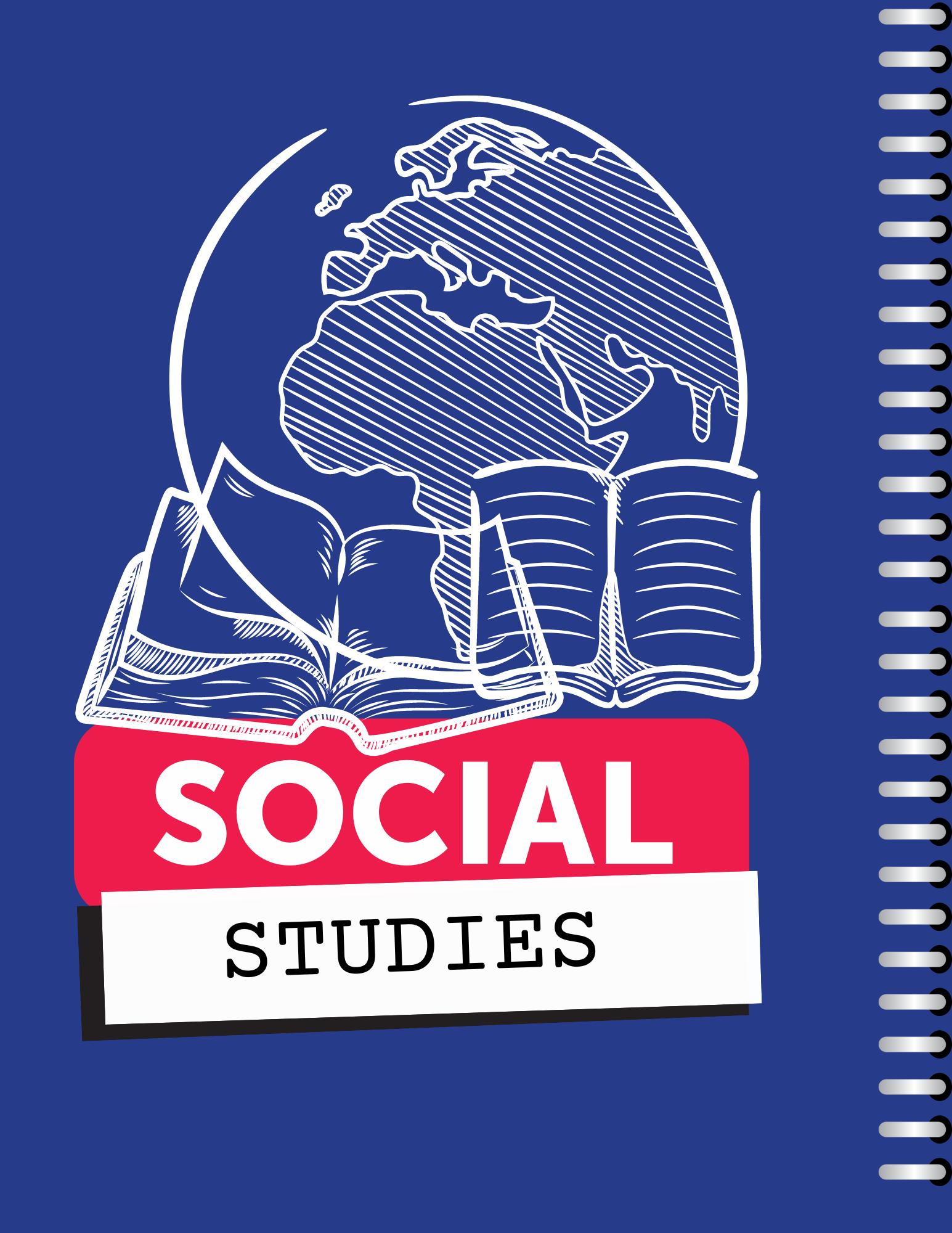
72
SOCIAL STUDIES
CHAIR: SARAH NEWMAN
The social studies department strives to teach students how to think, not what to think, as we prepare students for the responsibilities of citizenship. By helping students draw connections between the content and their world, we foster greater global awareness and literacy. Not only do we teach skills such as critical thinking, historical analysis, and writing, but also we endeavor to show and engender a sincere enthusiasm for learning. Young students of history look for encouragement and support as they explore and come to understand the world. The faculty at Norfolk Collegiate strives to support such exploration by developing and reinforcing the skills necessary to understand the complex drama of history. Through a progressive interdisciplinary approach, our students develop increased awareness of the major civilizations of the world.

73
SOCIAL STUDIES
U.S. HISTORY 6 will chronicle important events in United States history from the Civil War to current-day America. Students will explore major topics through a multicultural lens to develop a whole picture of major events such as Reconstruction, the Gilded Age, US involvement in World War I and World War II, the Great Depression, the 1960s, the Cold War, and current day (topics include pre and post-9/11 U.S. history). This class will largely focus on project-based learning but will also include an introduction to primary/secondary source analysis. Assessments will include projects, presentations, tests, quizzes and class participation. Note: The middle school history sequence moving forward will change to the following. Descriptions will be updated with each year’s course guide.
2025-26 Civics 7 replaces Geography 7
2026-27 World Geography 8 replaces History 8
GEOGRAPHY 7 focuses on the geography of the European countries, Russia, regions of Asia, and the interdependence of the entire global community. Economic systems, political structures, and international cooperation and conflict are examined both historically and in today’s current events. Continued development of map skills, chart and graph interpretations, critical thinking and writing, and oral presentations are an integral part of the program. In addition to academics, citizenship is stressed. This includes the opportunity to accept responsibility for the common good and concern for others while striving for excellence.
HISTORY 8 is a survey study of American history from the French and Indian War to the Korean and Vietnamese wars. The focus is on major events and themes throughout each time period. Class activities include simulations, projects, research papers, essays, and primary source analyses.
74

75
LEARNING RESOURCE SERVICES
DIRECTOR OF LEARNING RESOURCE SERVICES: LESLIE GULAK
The Learning Resource Center (LRC) offers a variety of academic support services for students in grades 6-12. These resource programs provide individual and small group academic and behavioral support for students who need assistance with specific content areas, reading, study skills, motor or listening skills, organization and time management. Learning specialists and tutors in the LRC collaborate with classroom teachers to help them understand students’ learning challenges, needs and strengths and to facilitate accommodations for students with documented learning disabilities. Students who are enrolled in the LRC for tutoring and other support services pay an additional fee (separate from tuition), which covers the cost of providing individualized support and instruction. Learning Resources courses are non-credit-bearing.
Students who receive classroom accommodations have documented learning disabilities that have been identified by a psychologist or learning disabilities specialist through psycho-educational or neuropsychological testing. These accommodations, which may include extended time, oral testing, testing away from the group, a spelling waiver, or the use of a laptop computer or calculator, are only provided for students with educational testing completed within the past three years that clearly documents the disability and its impact on the student’s learning. It is important to have educational testing updated every three years as students’ learning ability and accommodation needs often change over time. Testing updates help classroom teachers and the resource staff better understand and assist with students’ learning needs, and they are ultimately required by the College Board, ETS (Educational Testing Service) and the ACT in order to request accommodations for College Board and ACT testing.

76
LEARNING RESOURCE SERVICES
LRC 6, 7, AND 8 are available to students with educational testing or documented learning differences, in consultation with school administration. Students who are enrolled in the LRC receive small group tutoring during a daily class period that includes assistance with study skills, time management, test-taking skills and organization, content tutoring and review and any prescribed classroom accommodations. LRC learning specialists communicate with classroom teachers and parents on a regular basis. In order to be eligible for LRC support, students must have educational testing and/or documented learning differences. Each student in the LRC receives a learning plan, created in consultation with the student and family. Note: This service is offered for an additional fee.
77
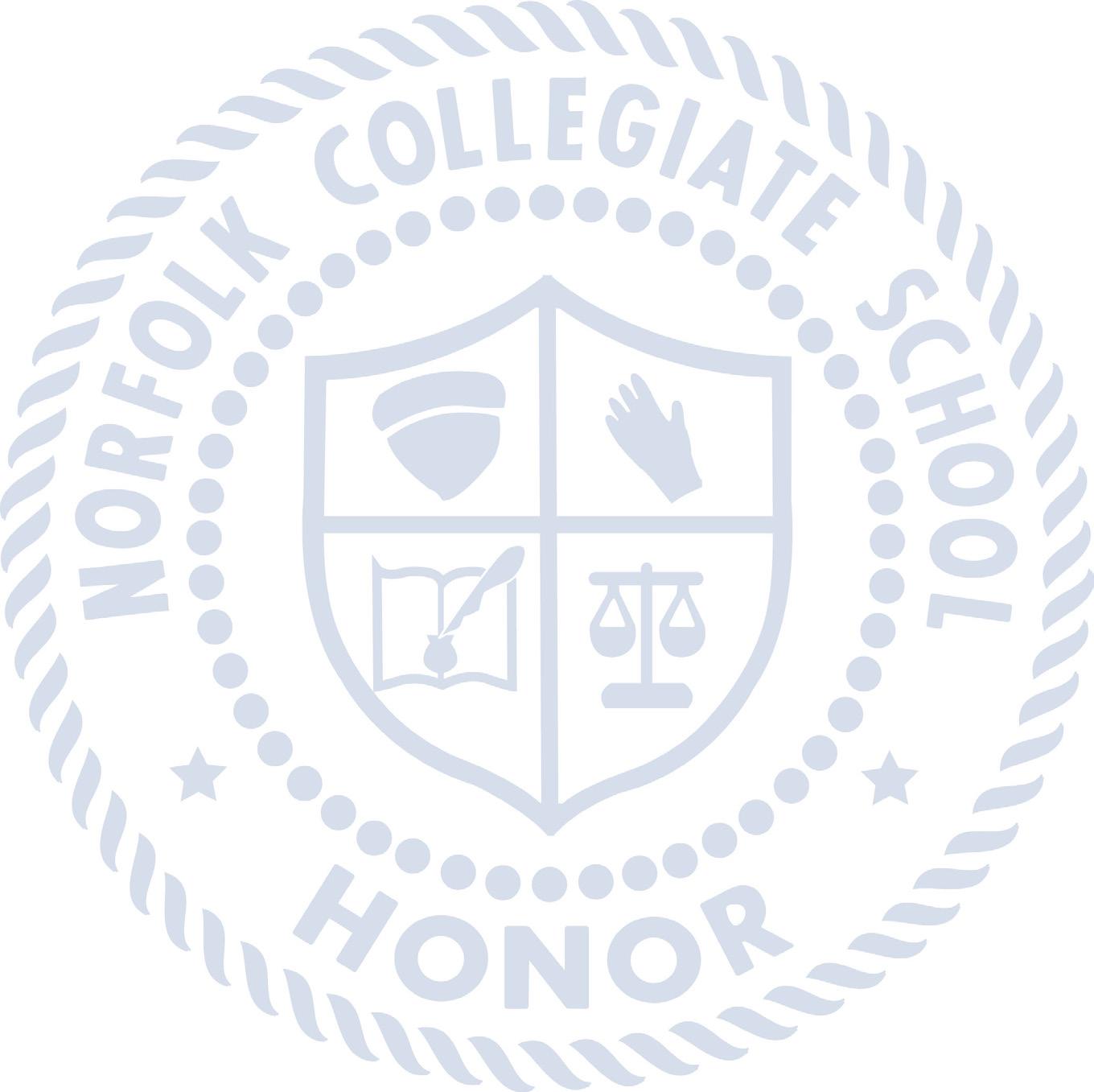
Norfolk Collegiate develops critical thinkers, doers and explorers through innovative, engaging instruction in an inclusive and supportive learning community. LOWER SCHOOL 5429 Tidewater Drive | Norfolk, VA 23509 MIDDLE & UPPER SCHOOL AND ADMINISTRATIVE OFFICES 7336 Granby Street | Norfolk, VA 23505 ADMISSIONS (757) 480-1495 norfolkcollegiate.org




































